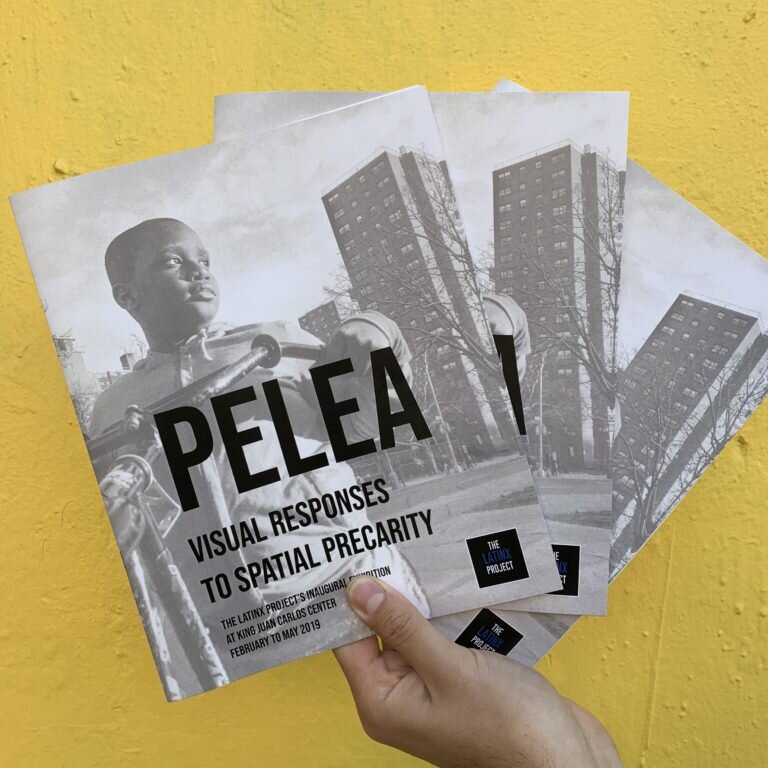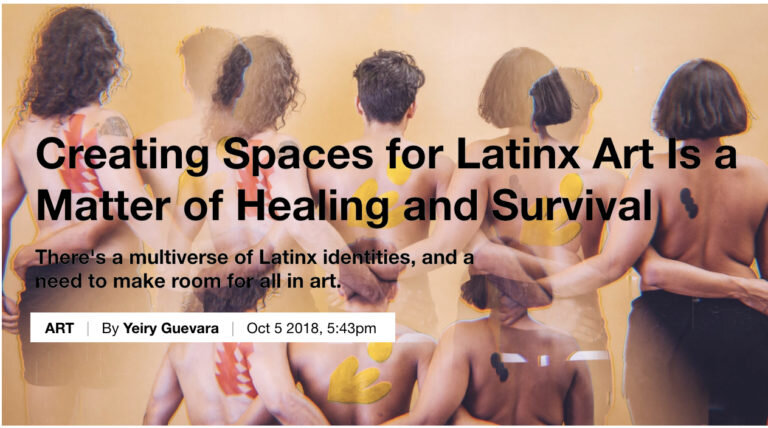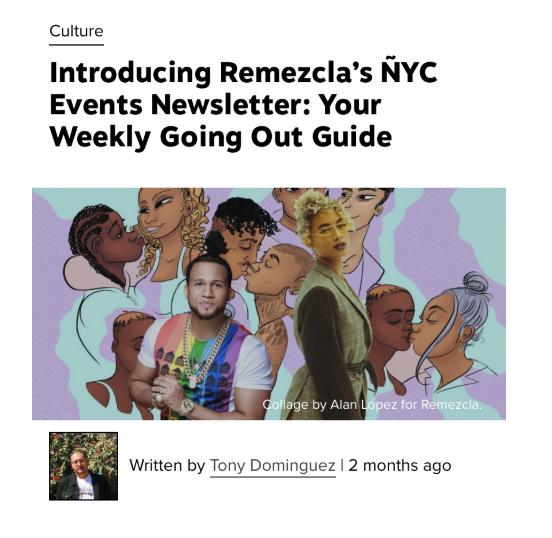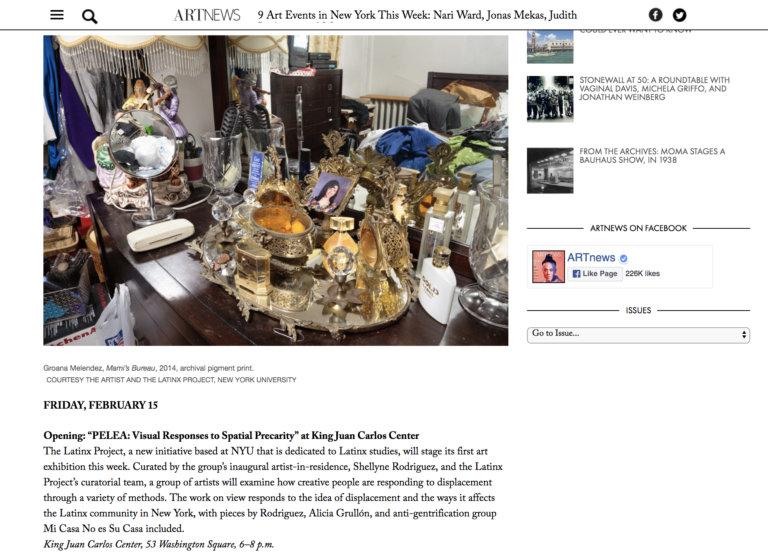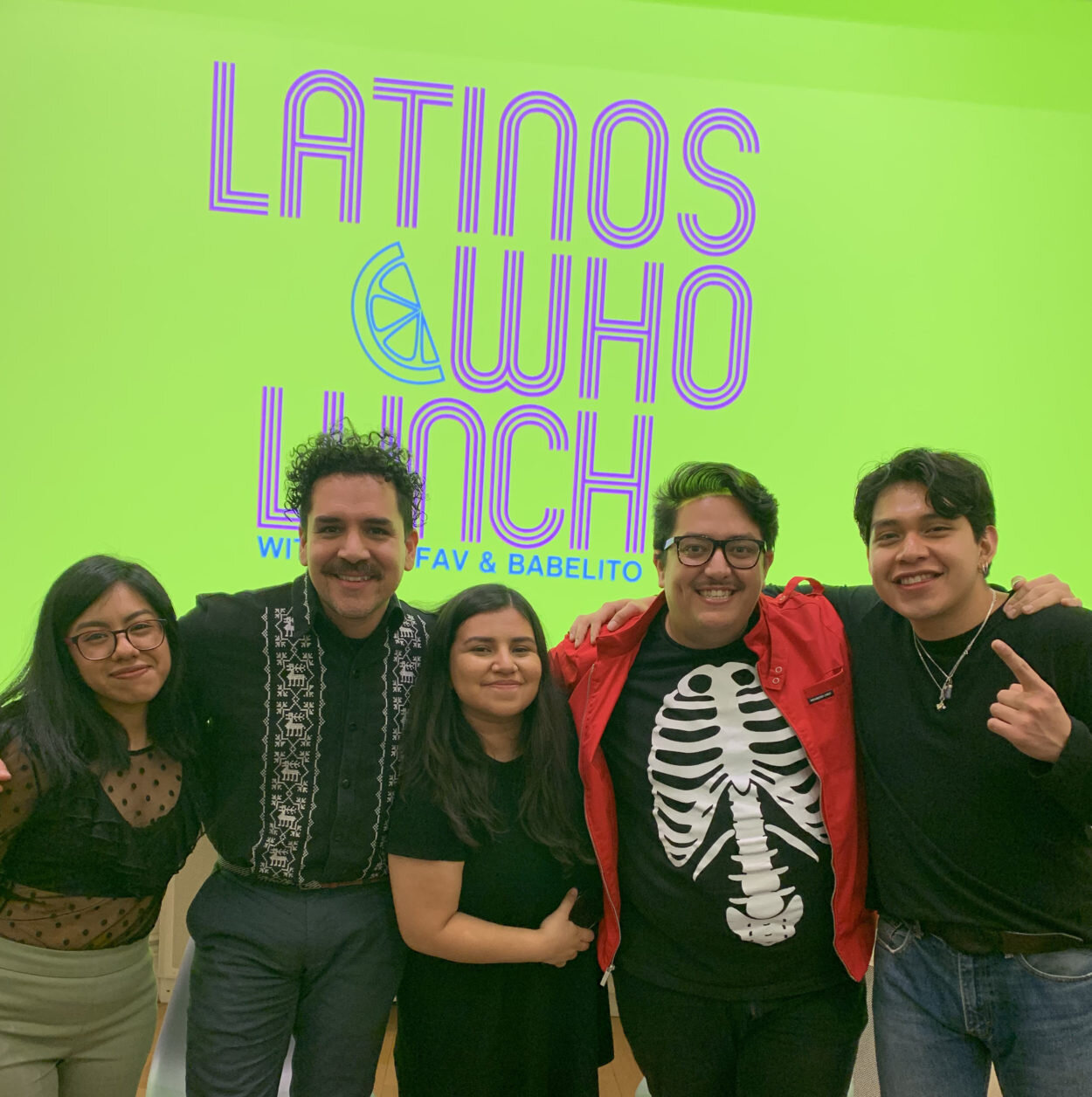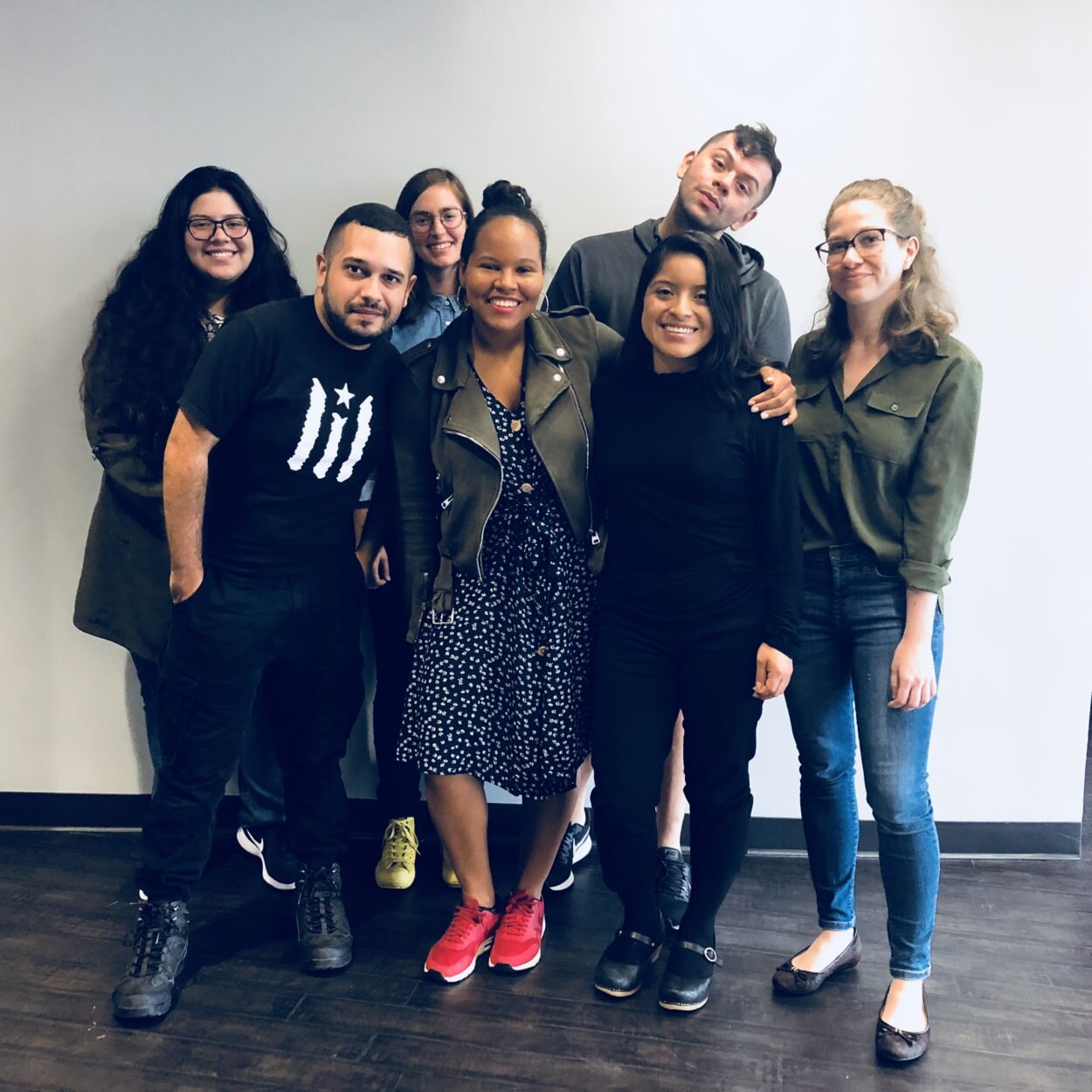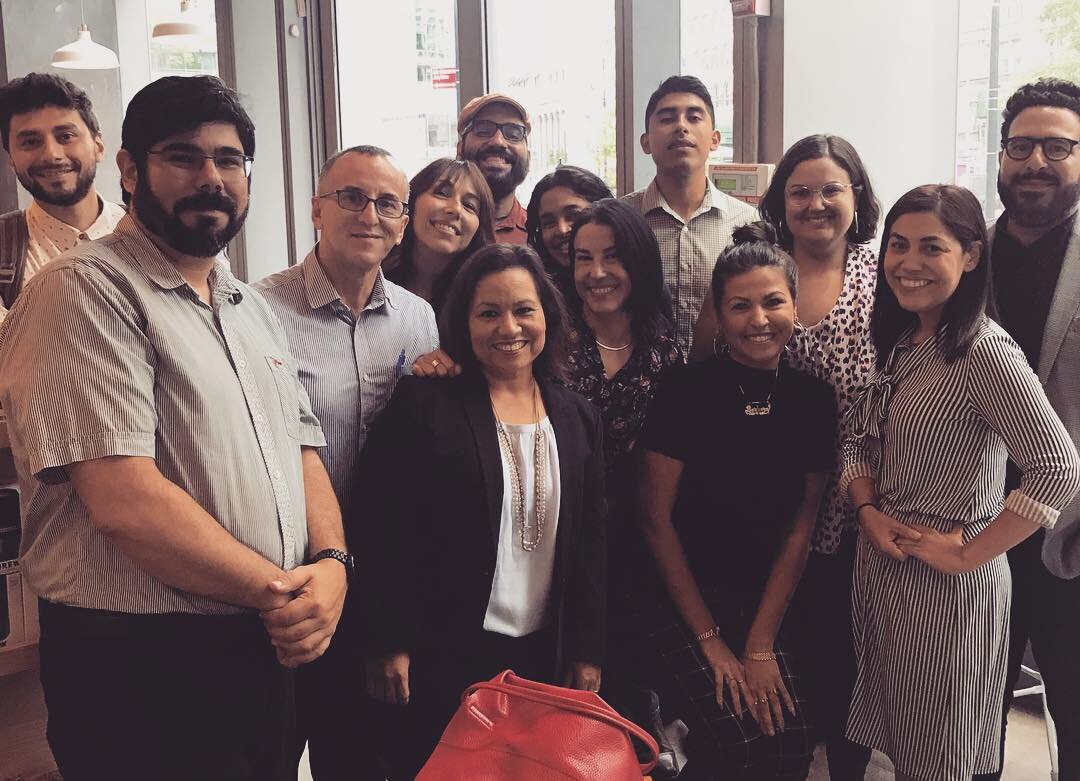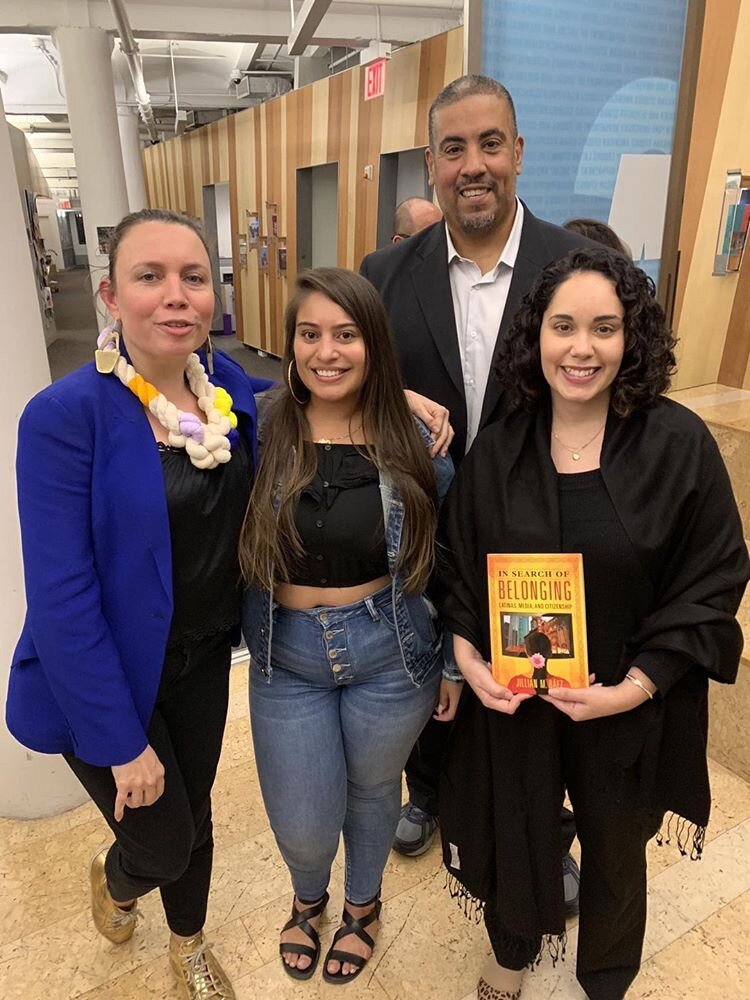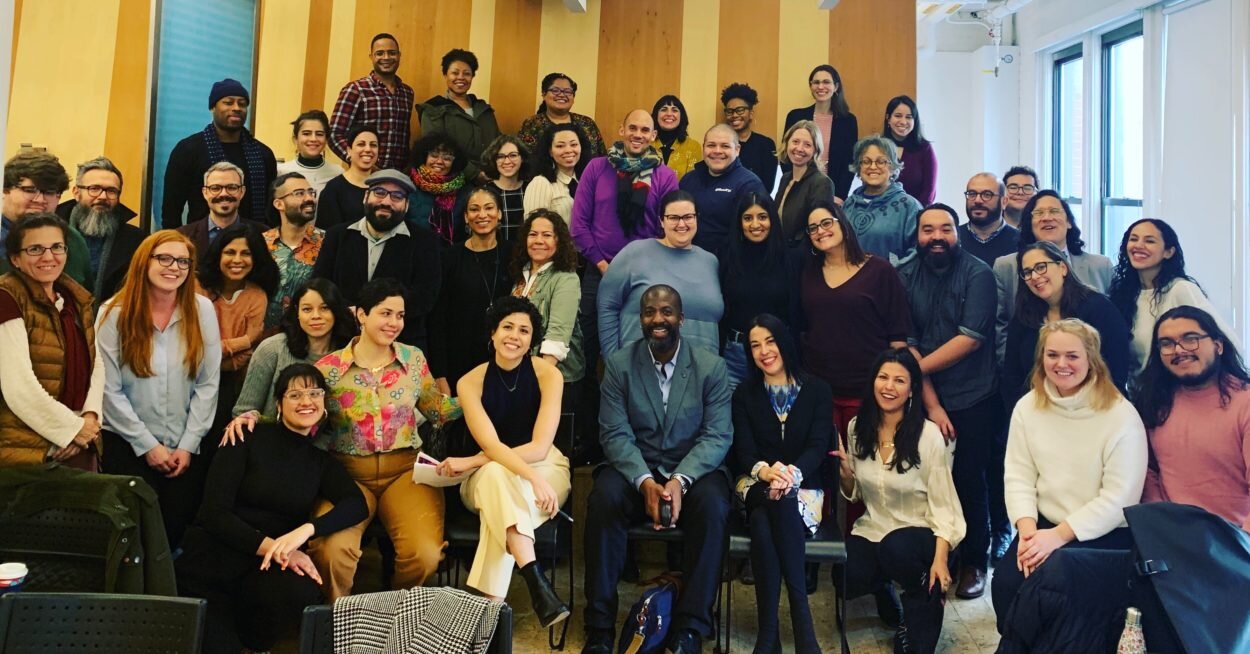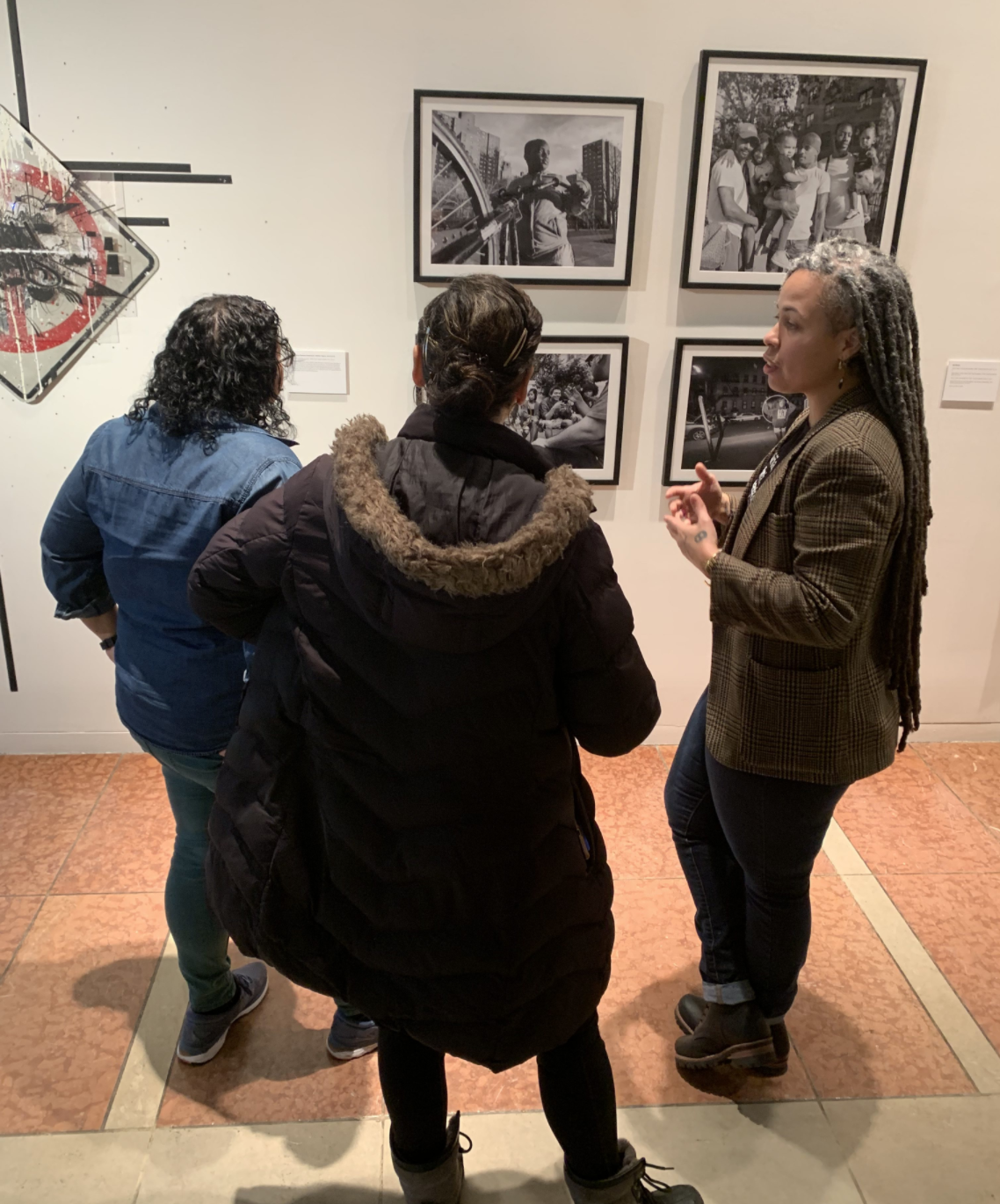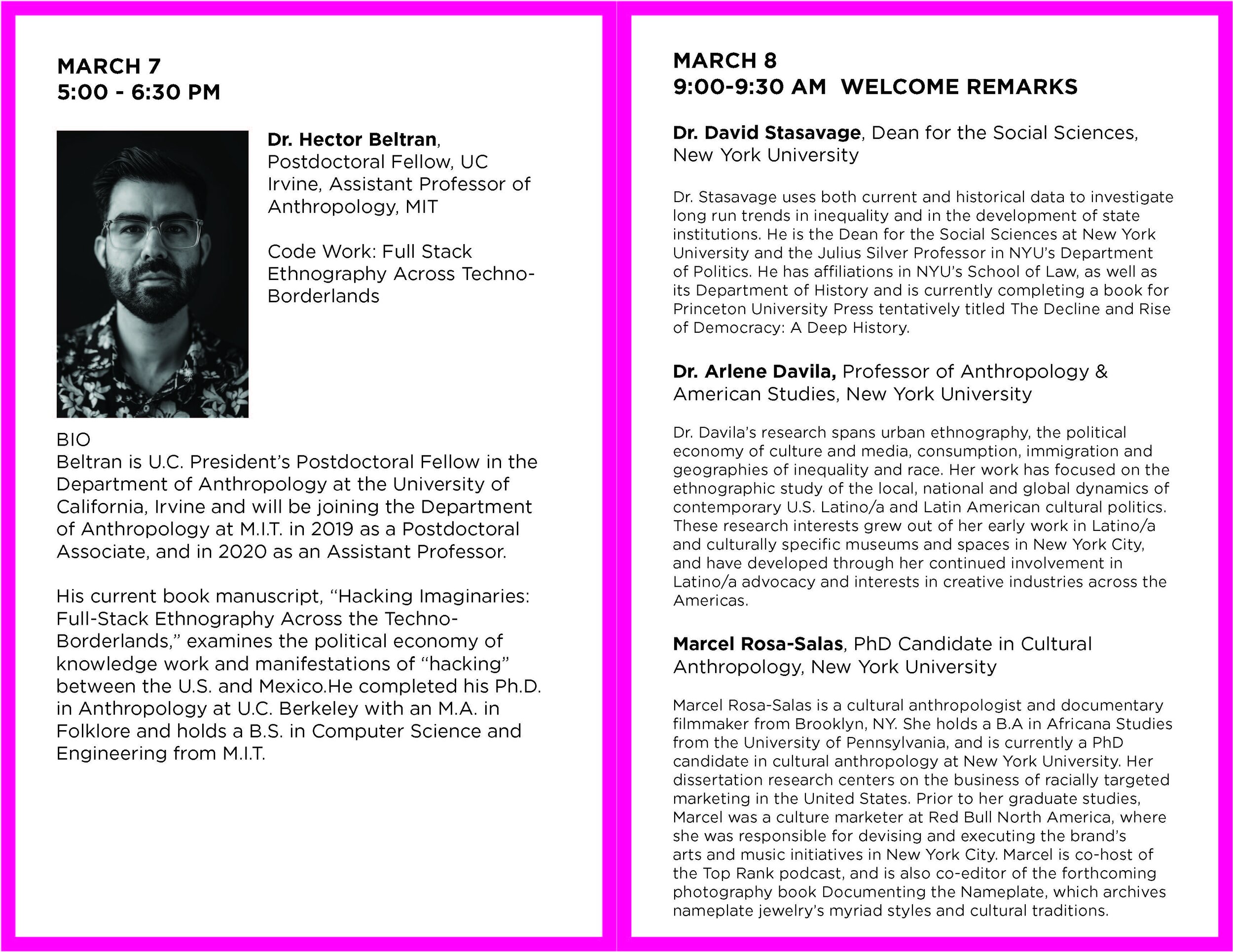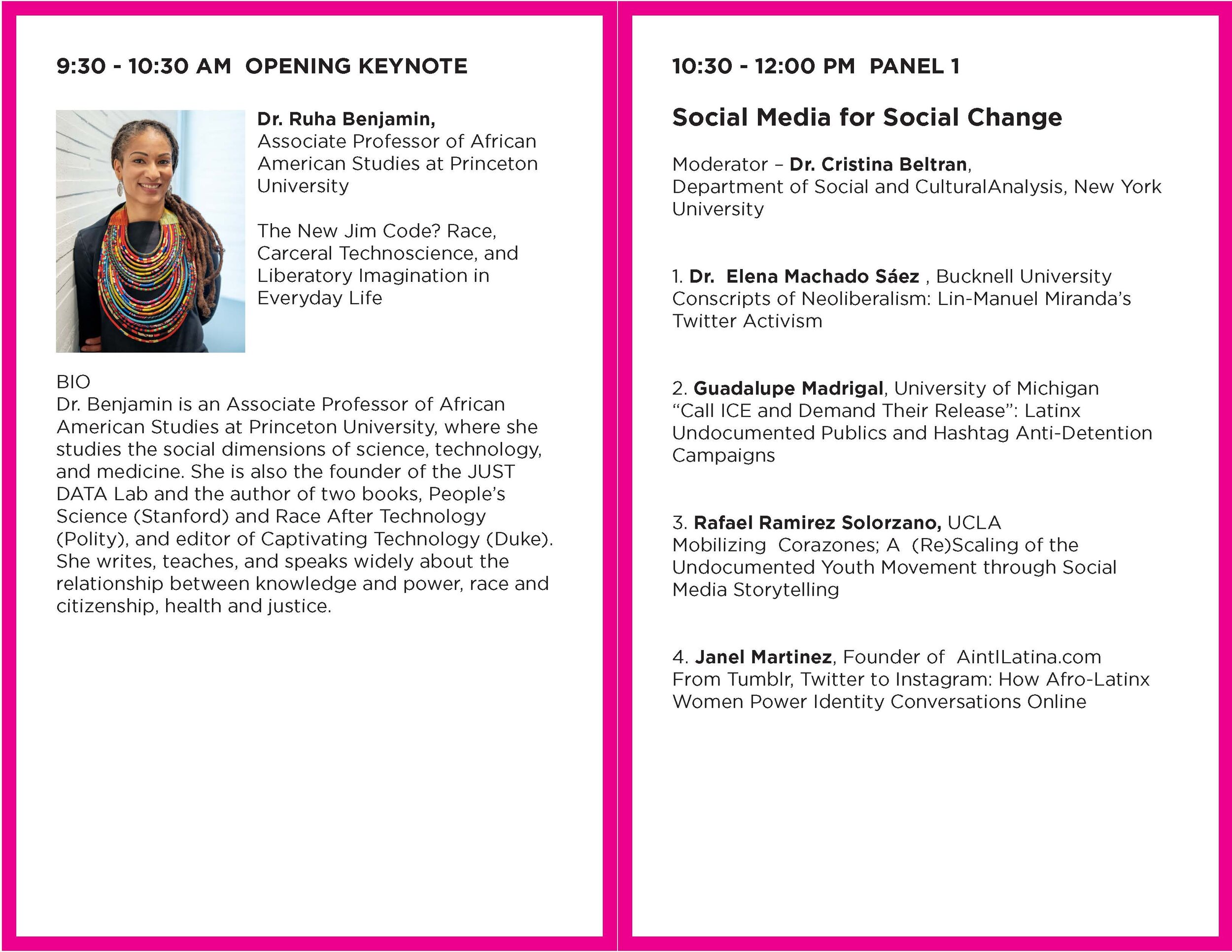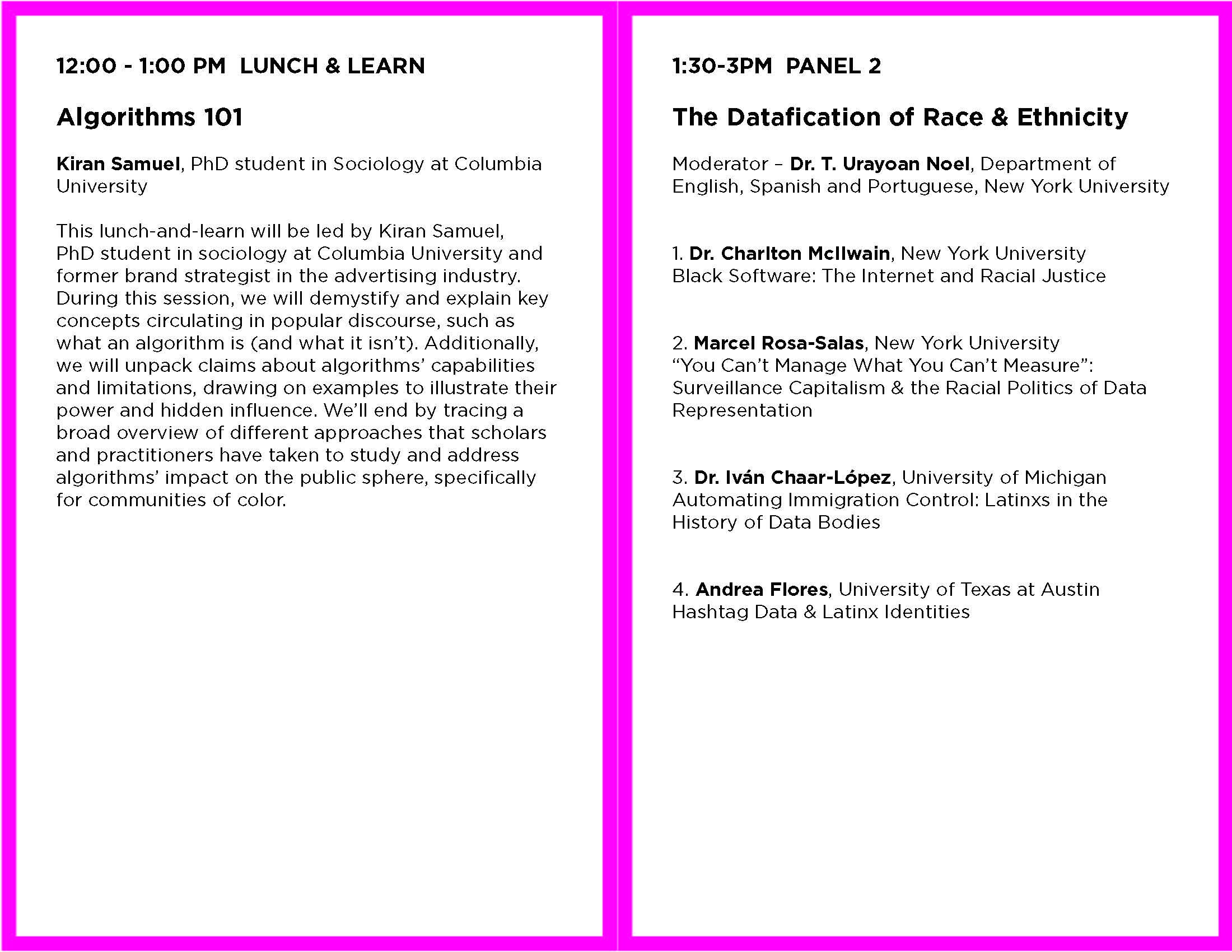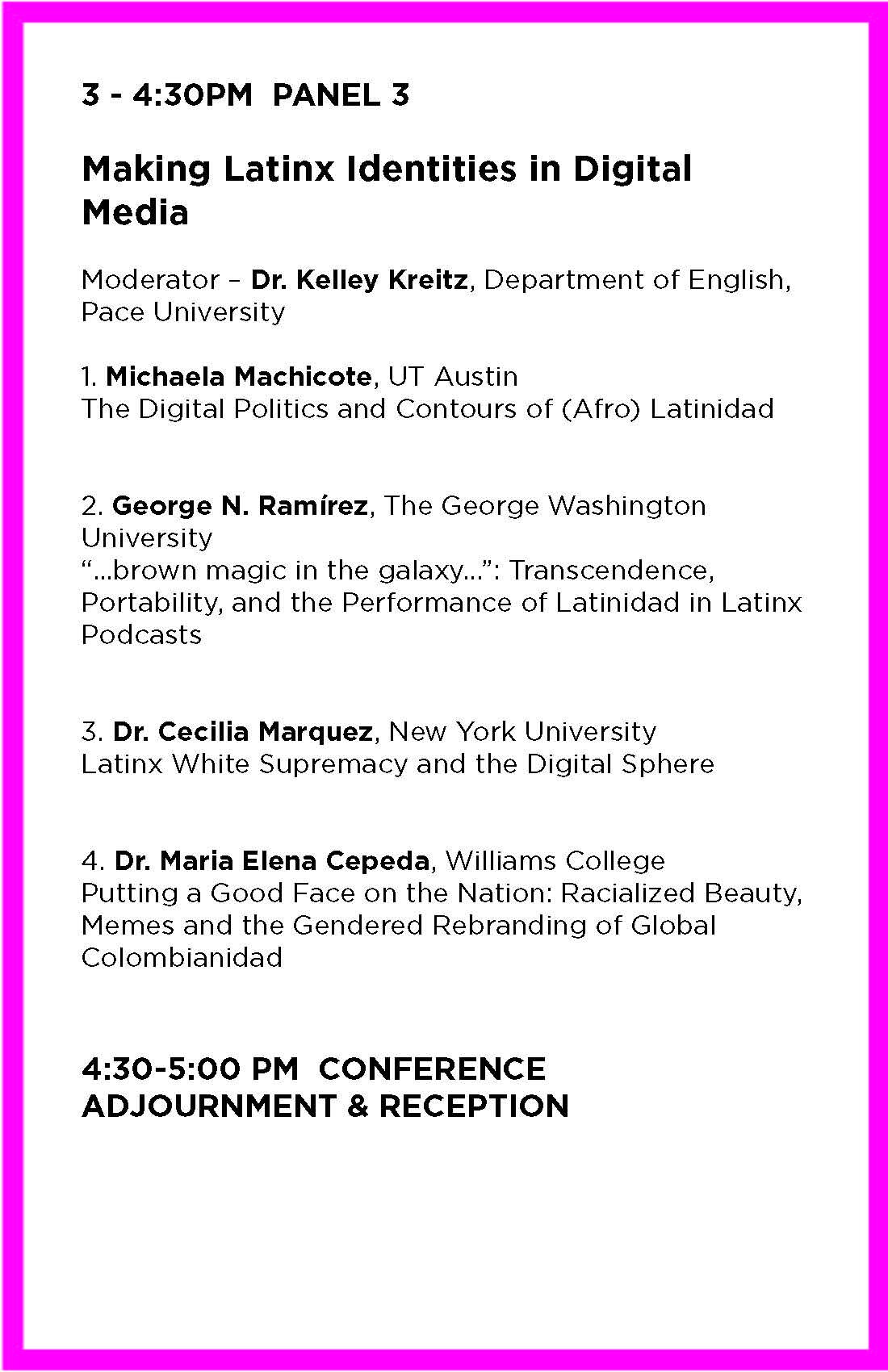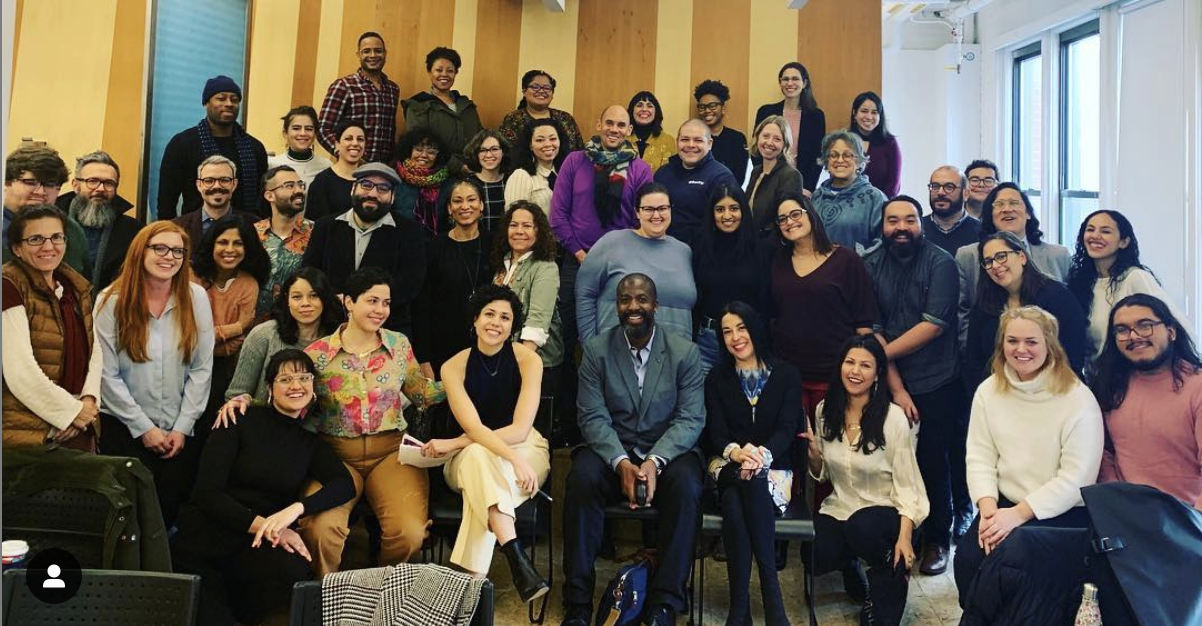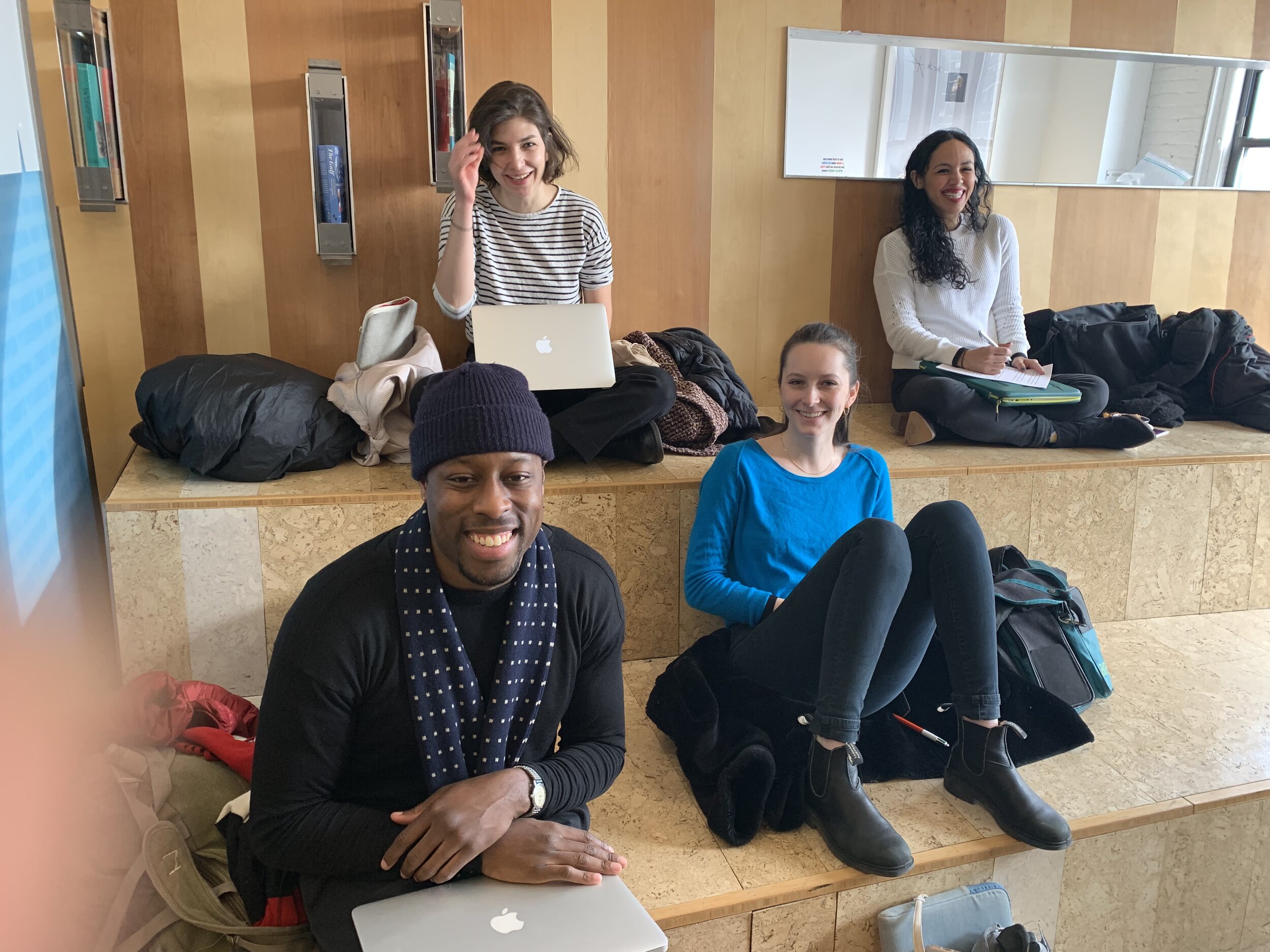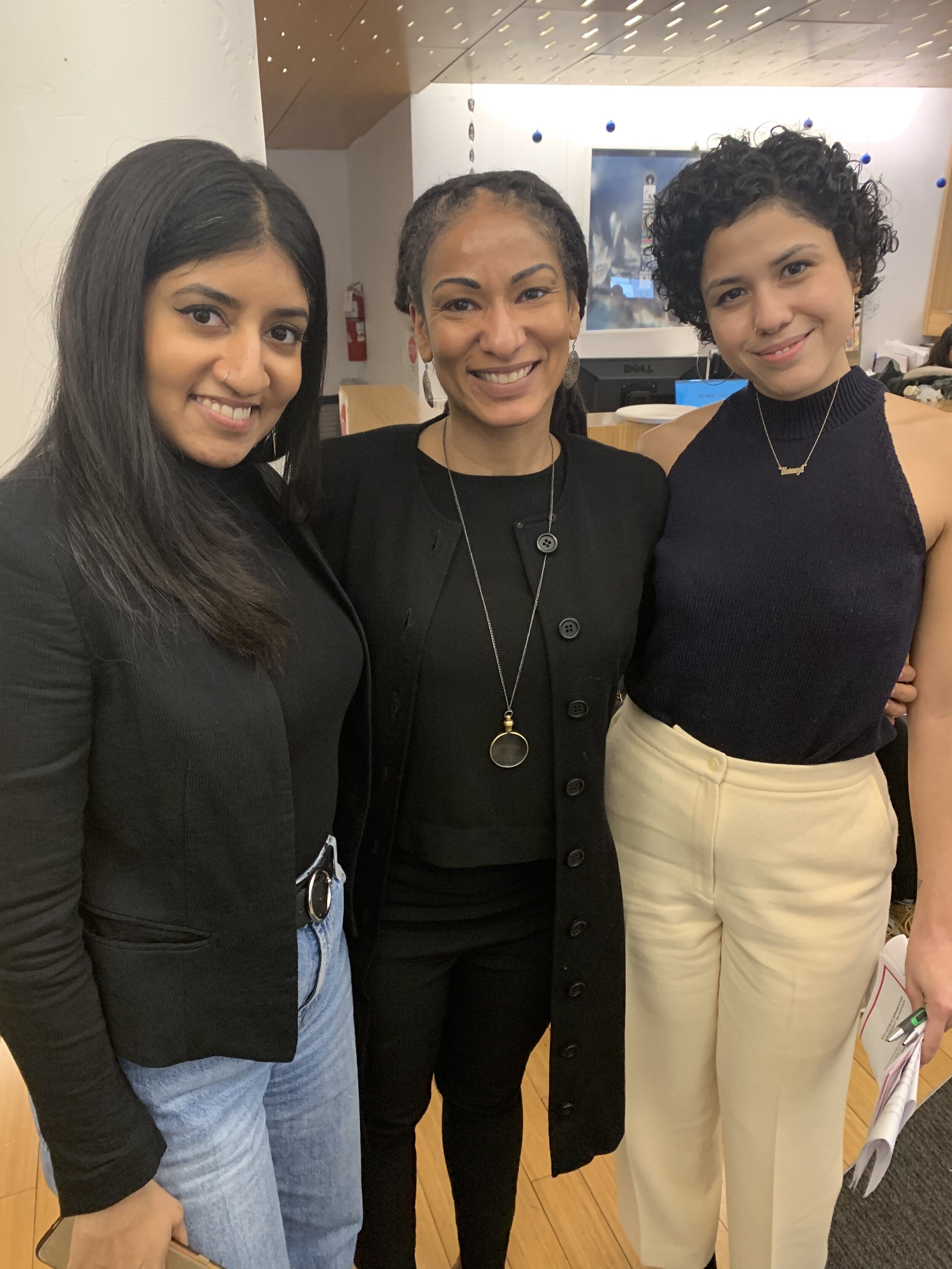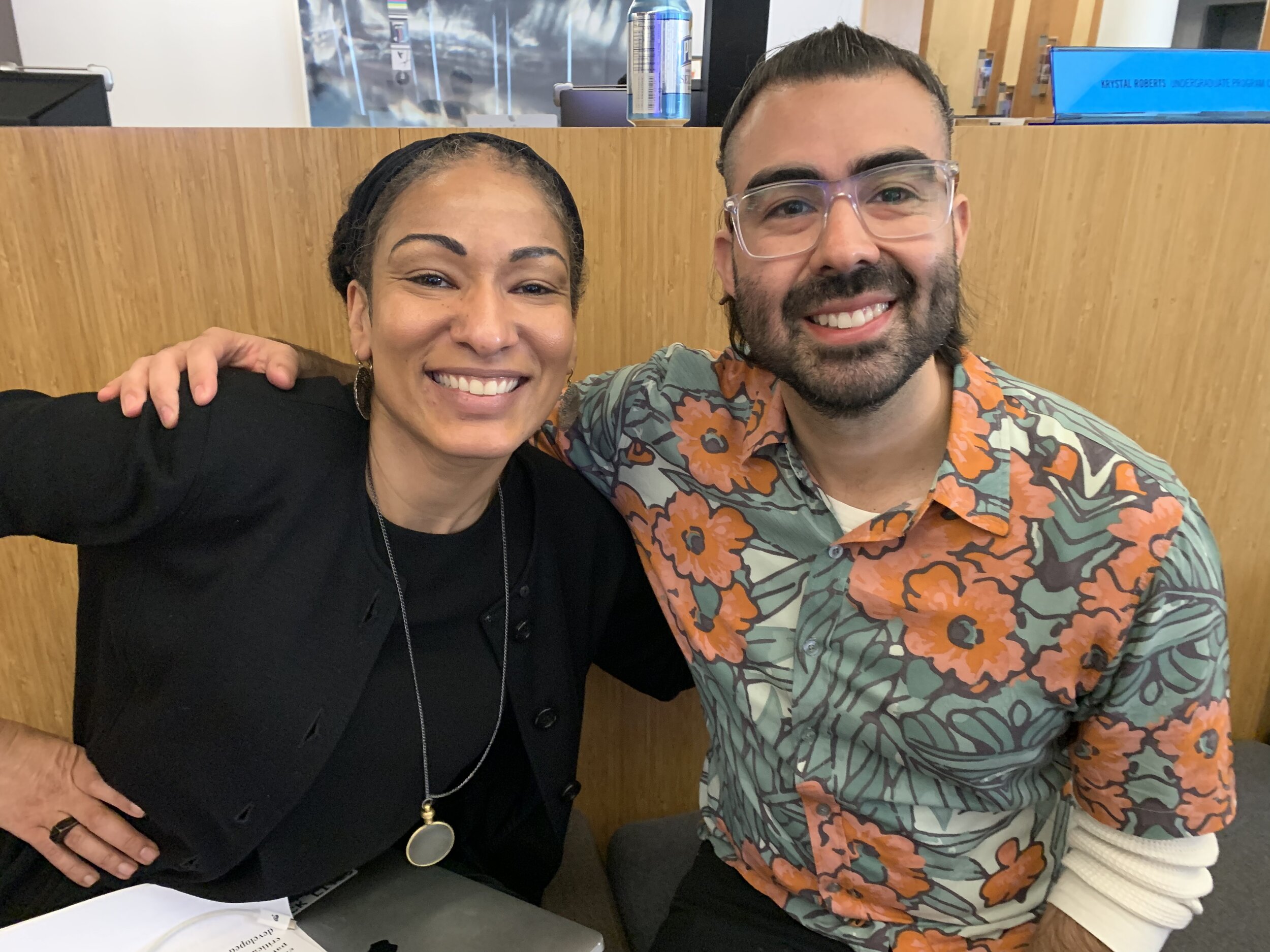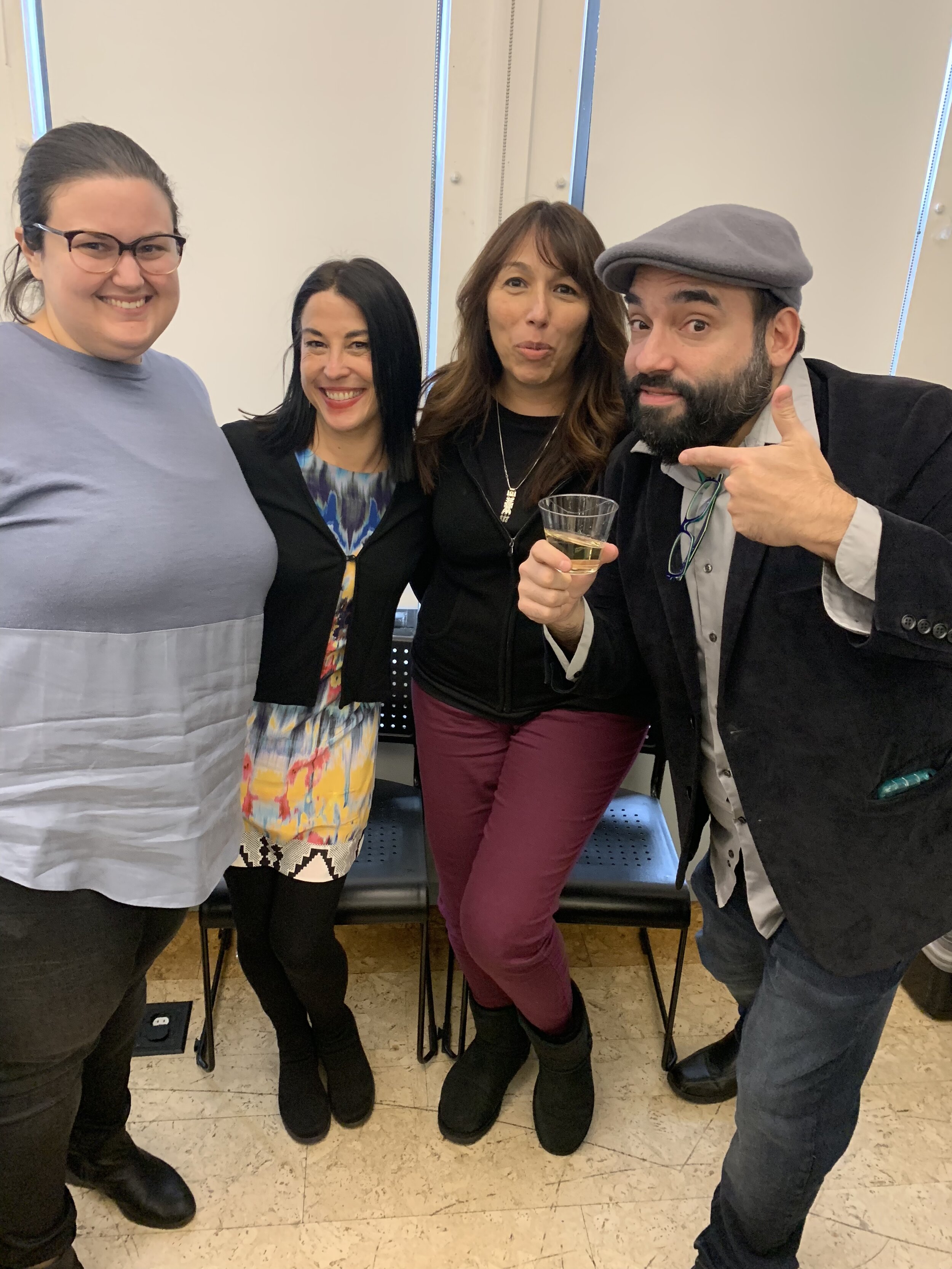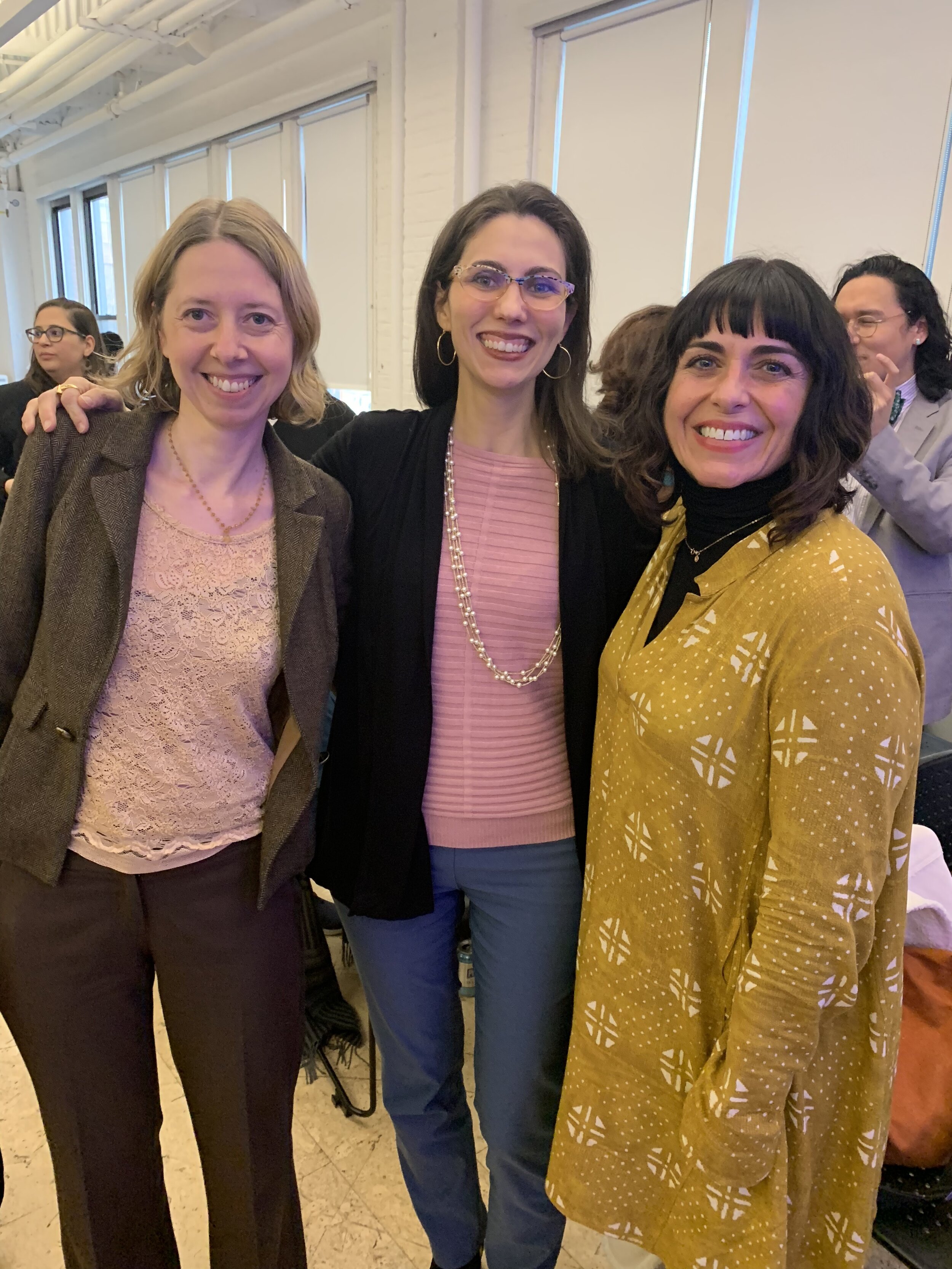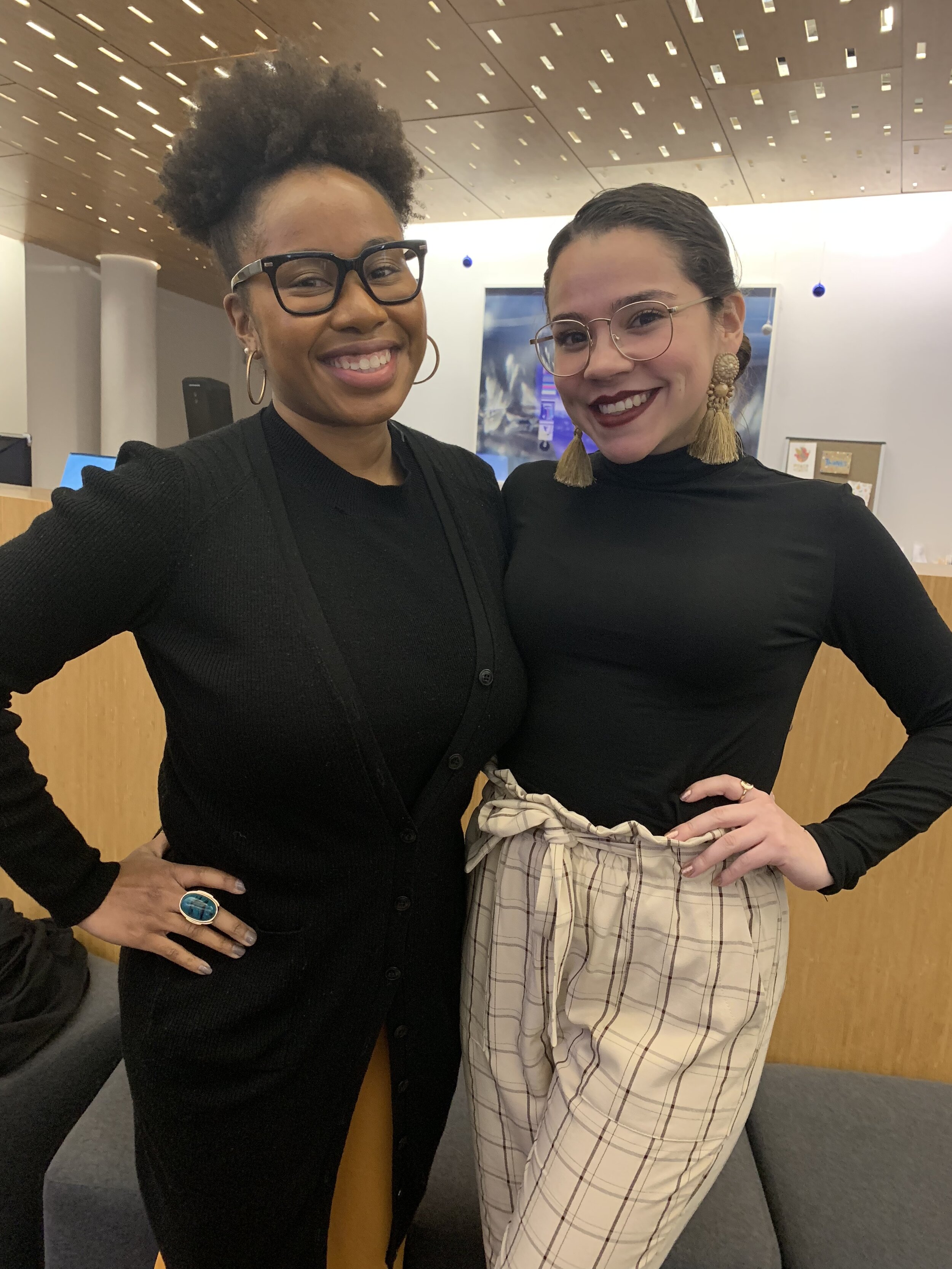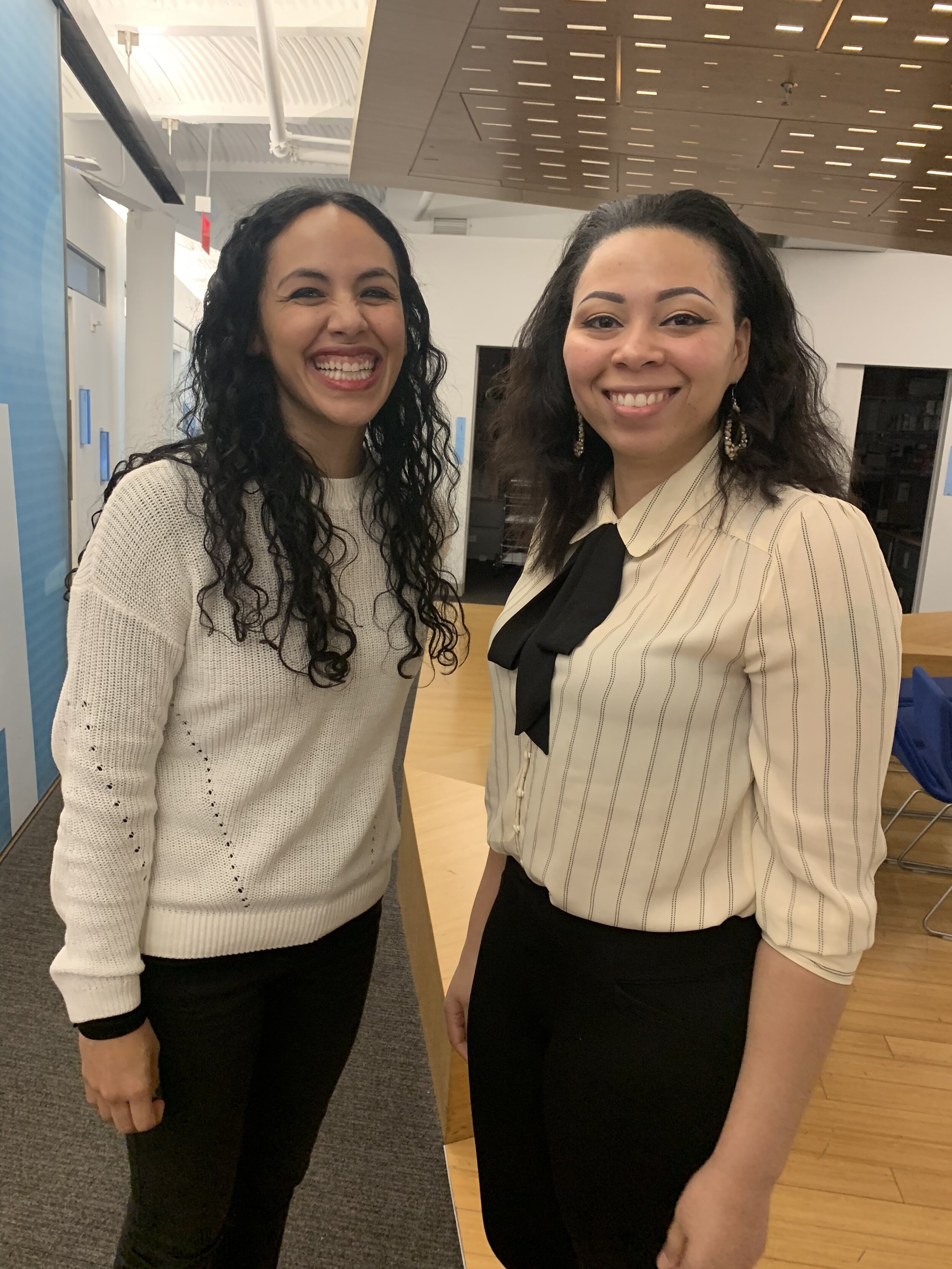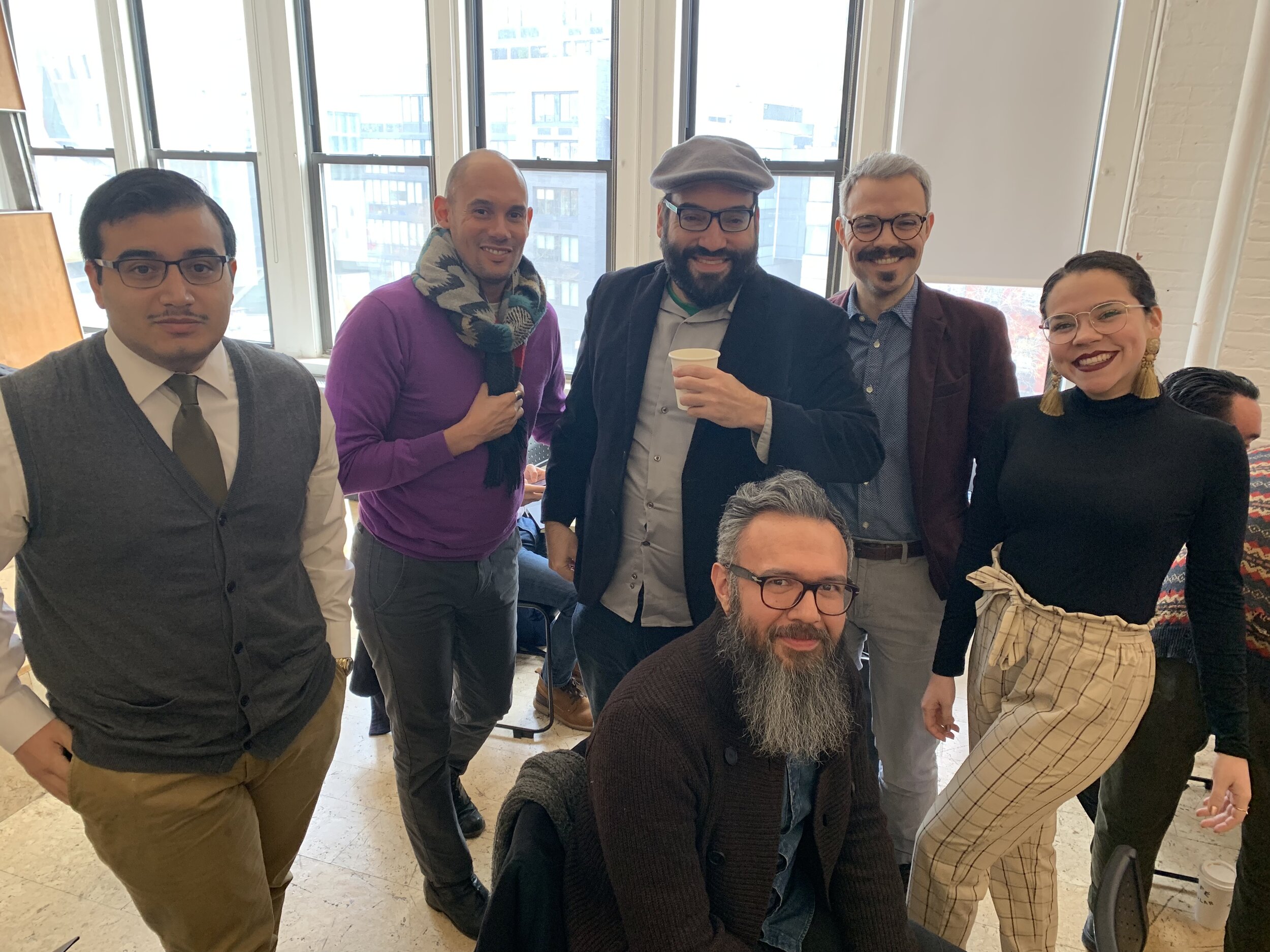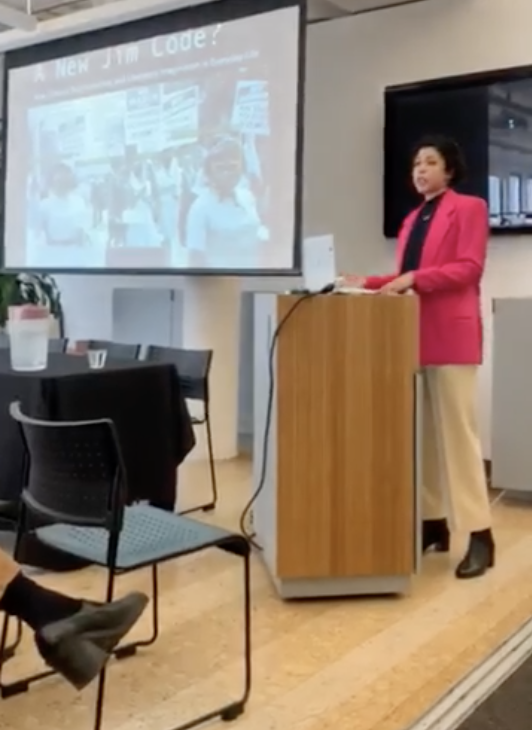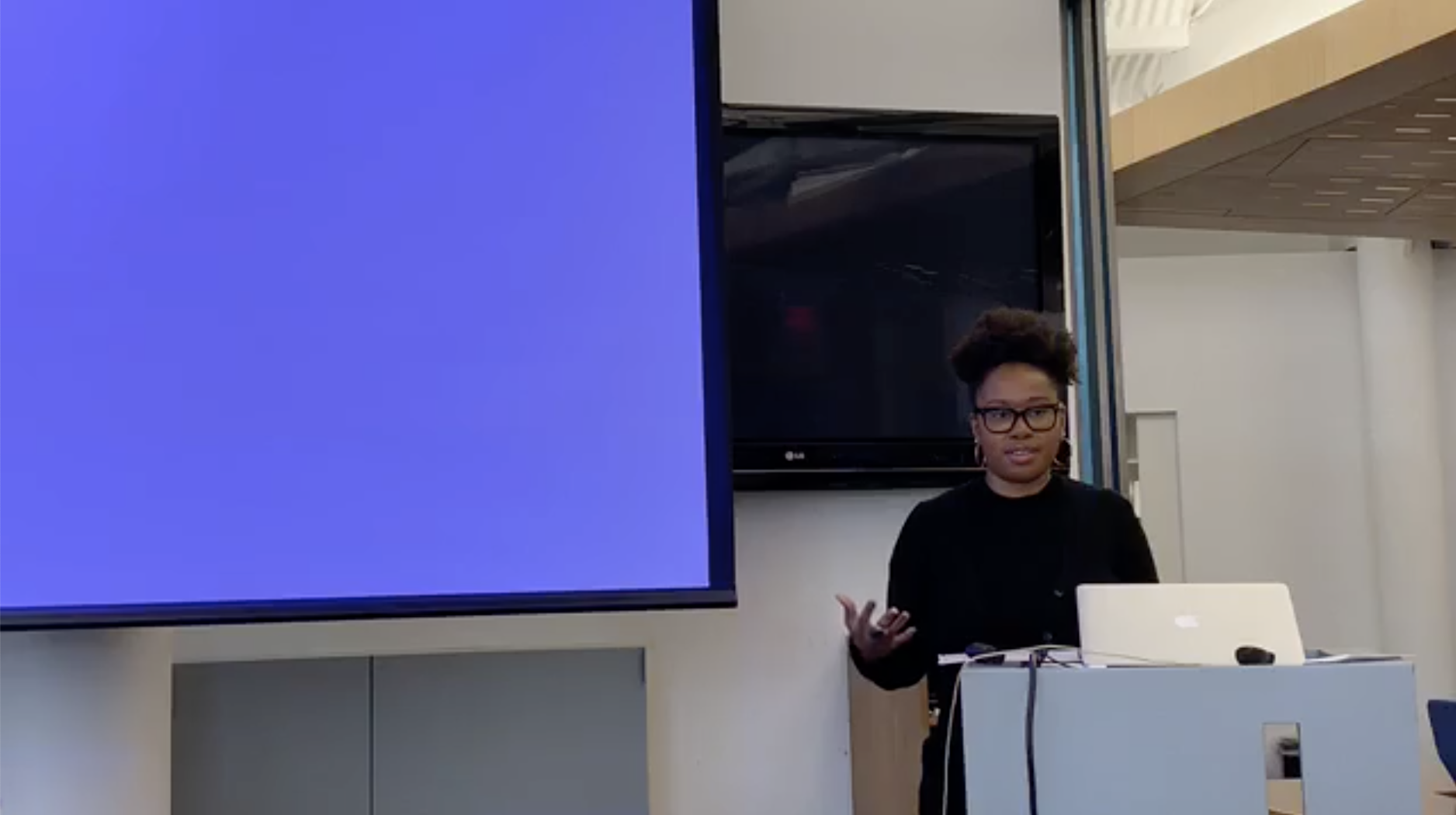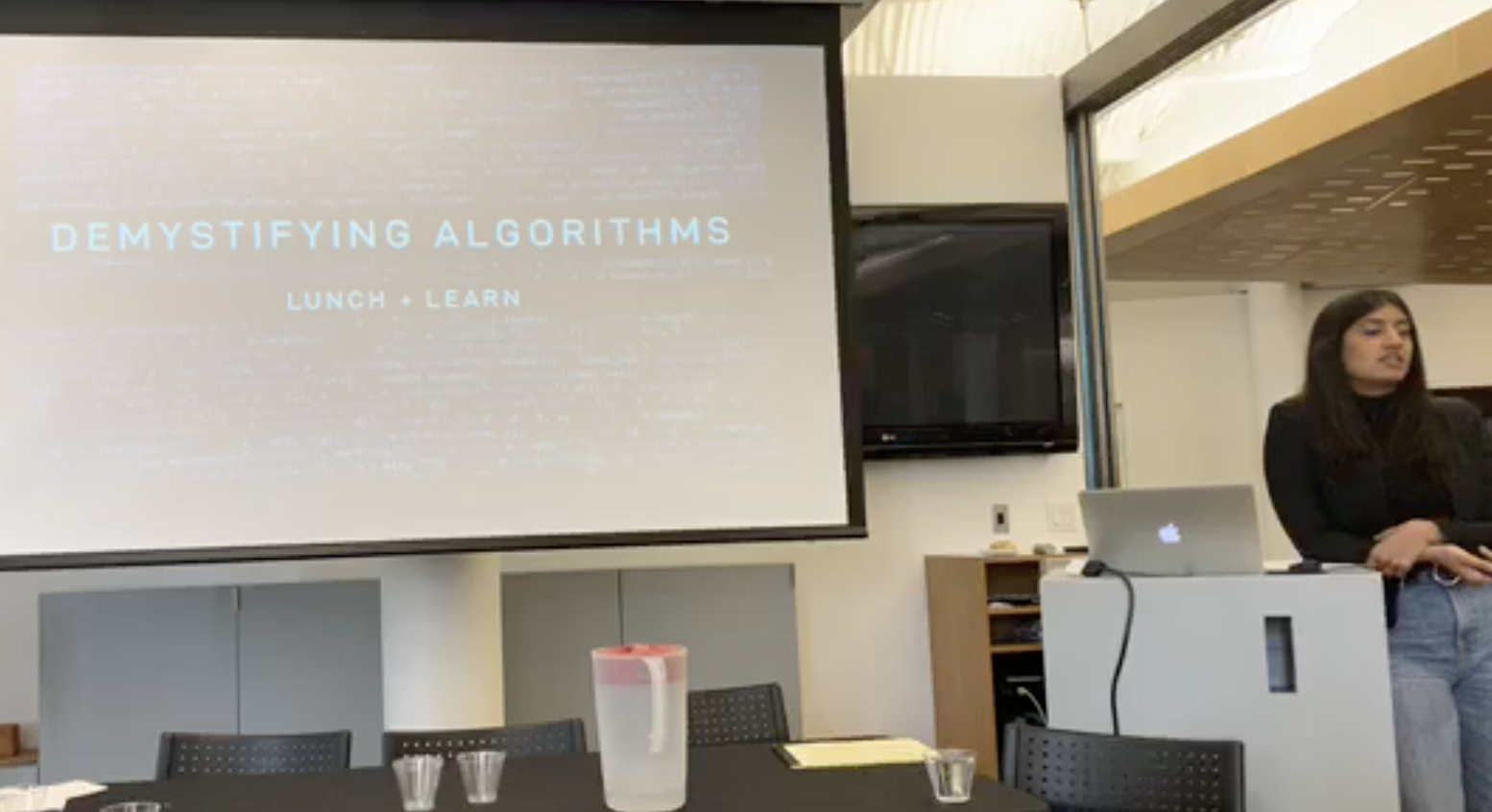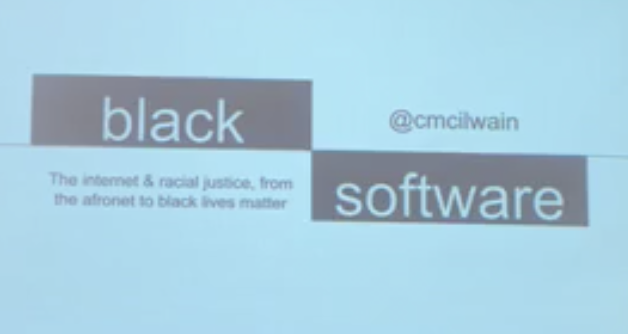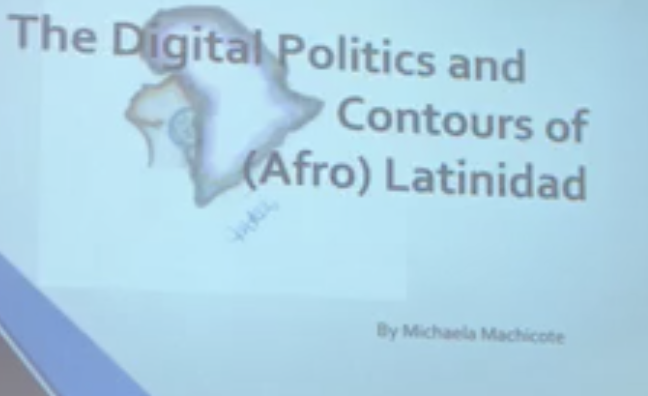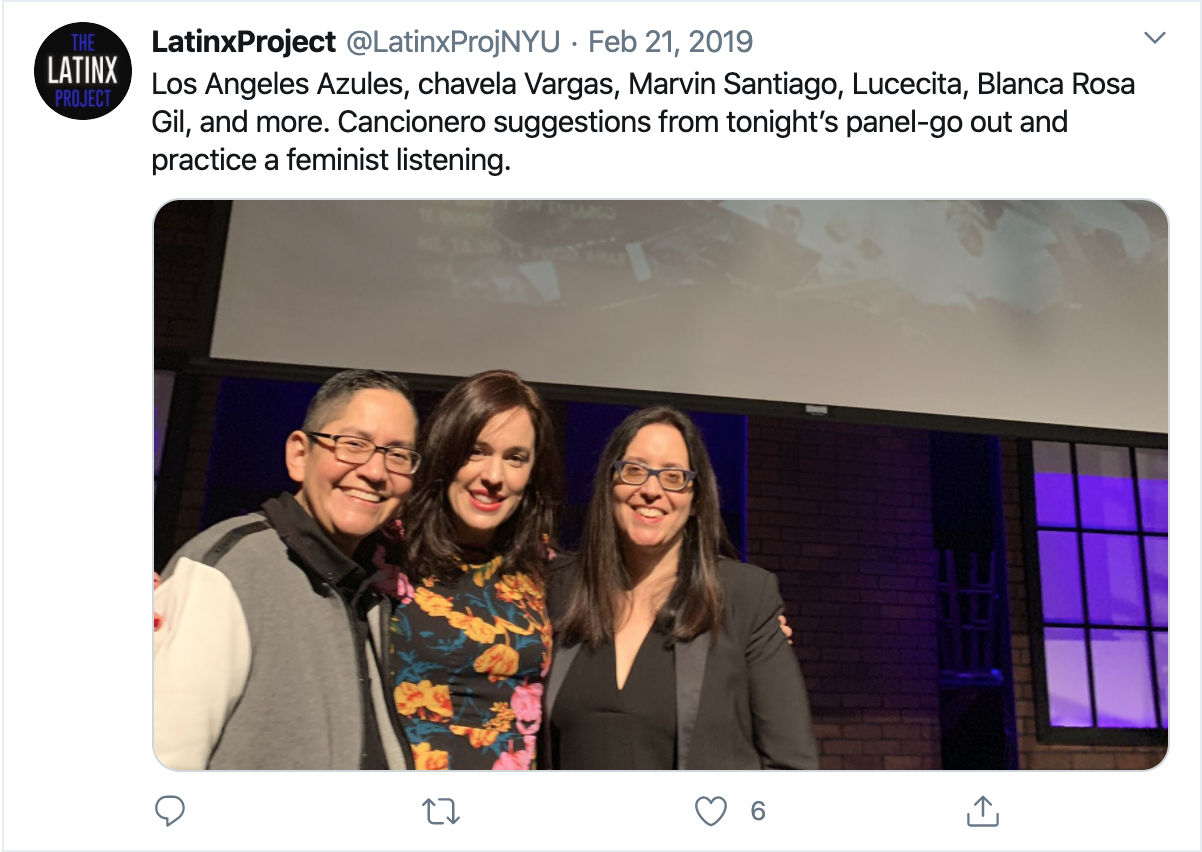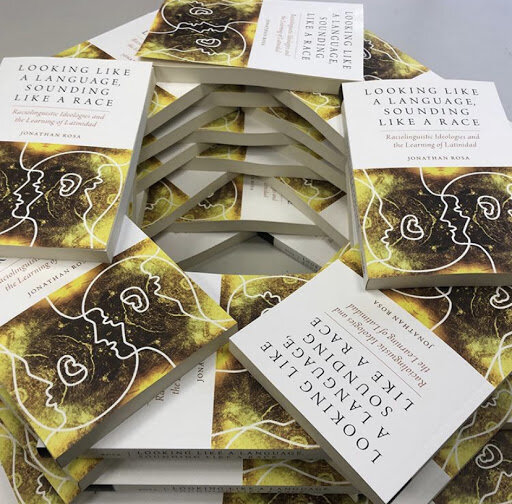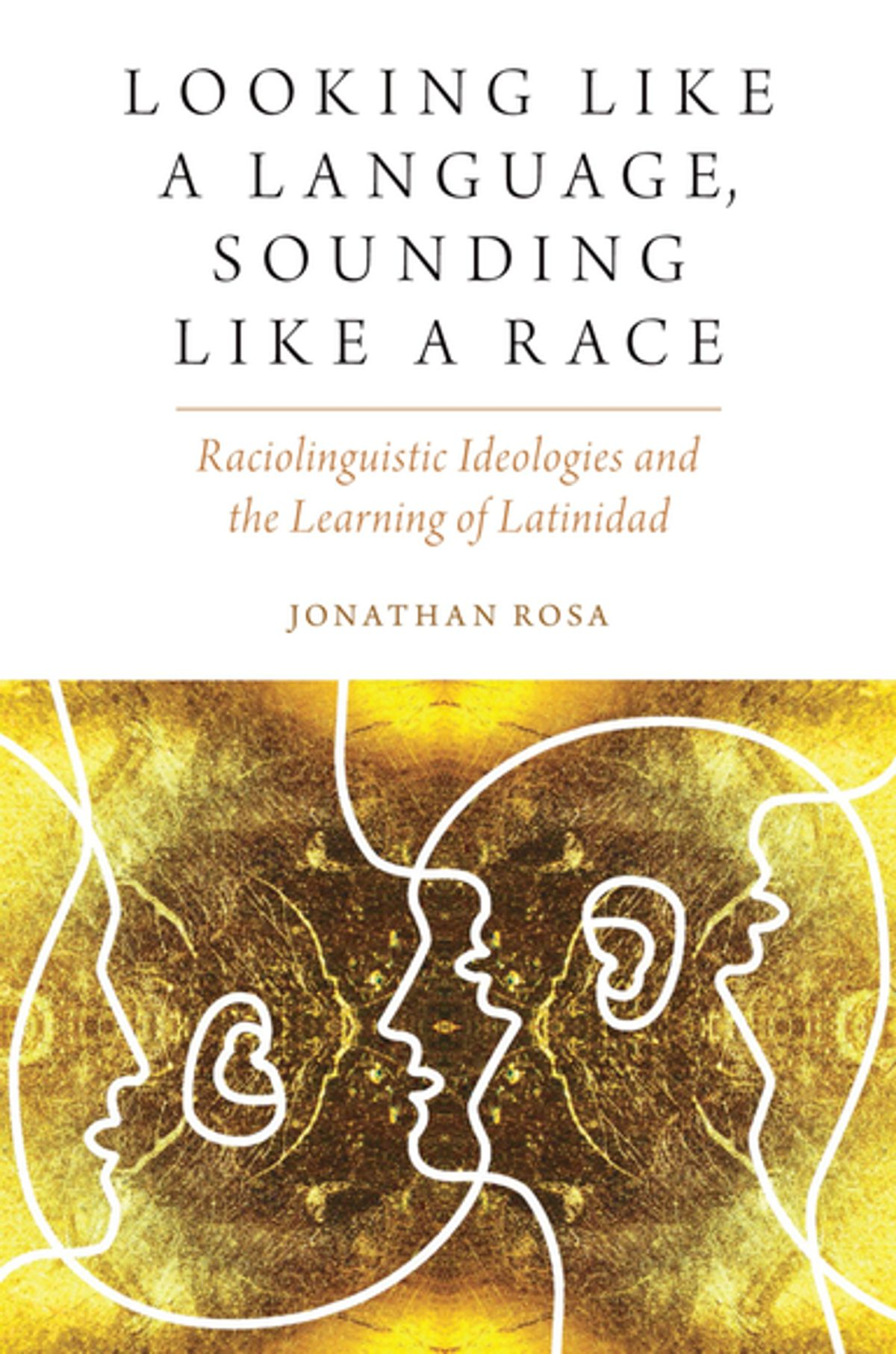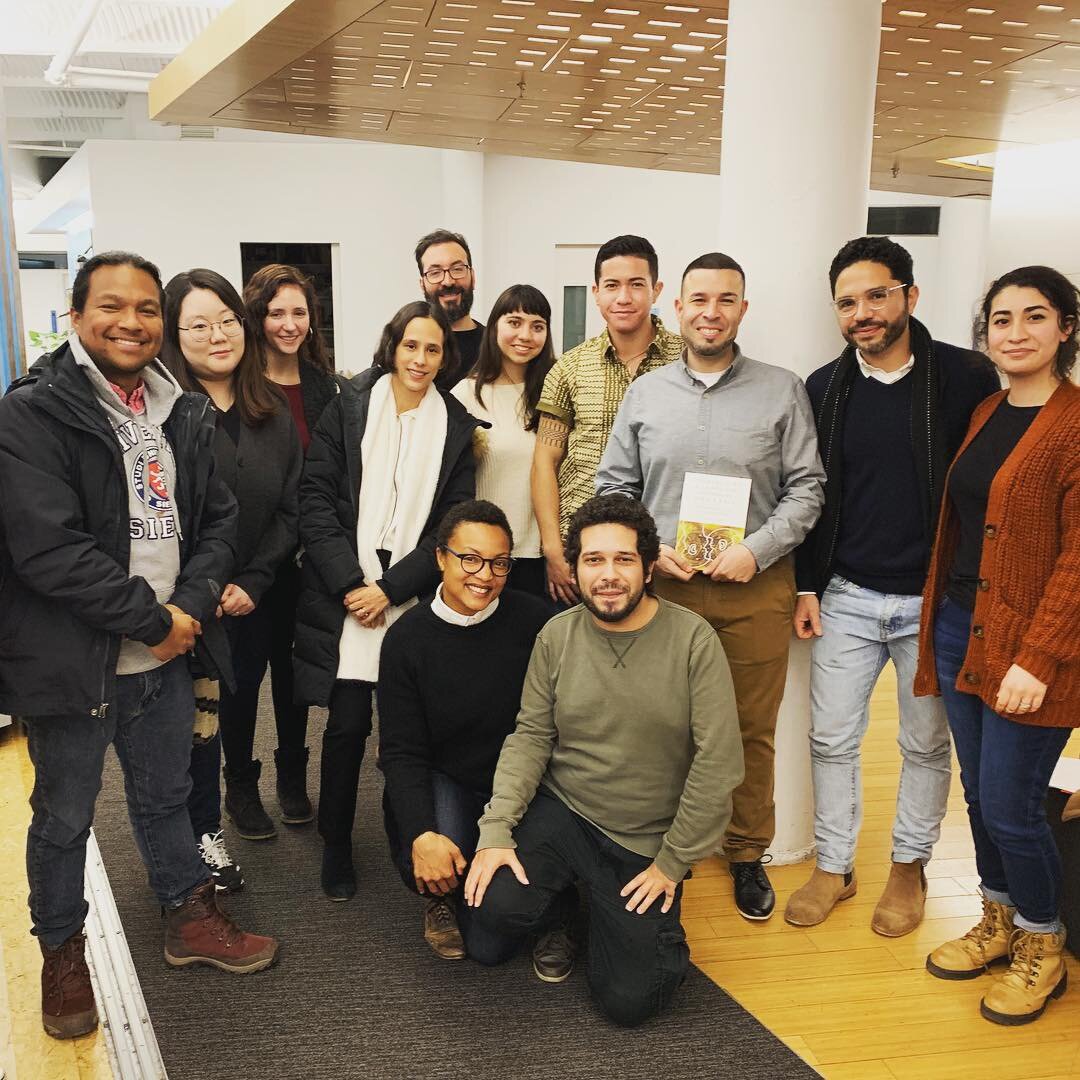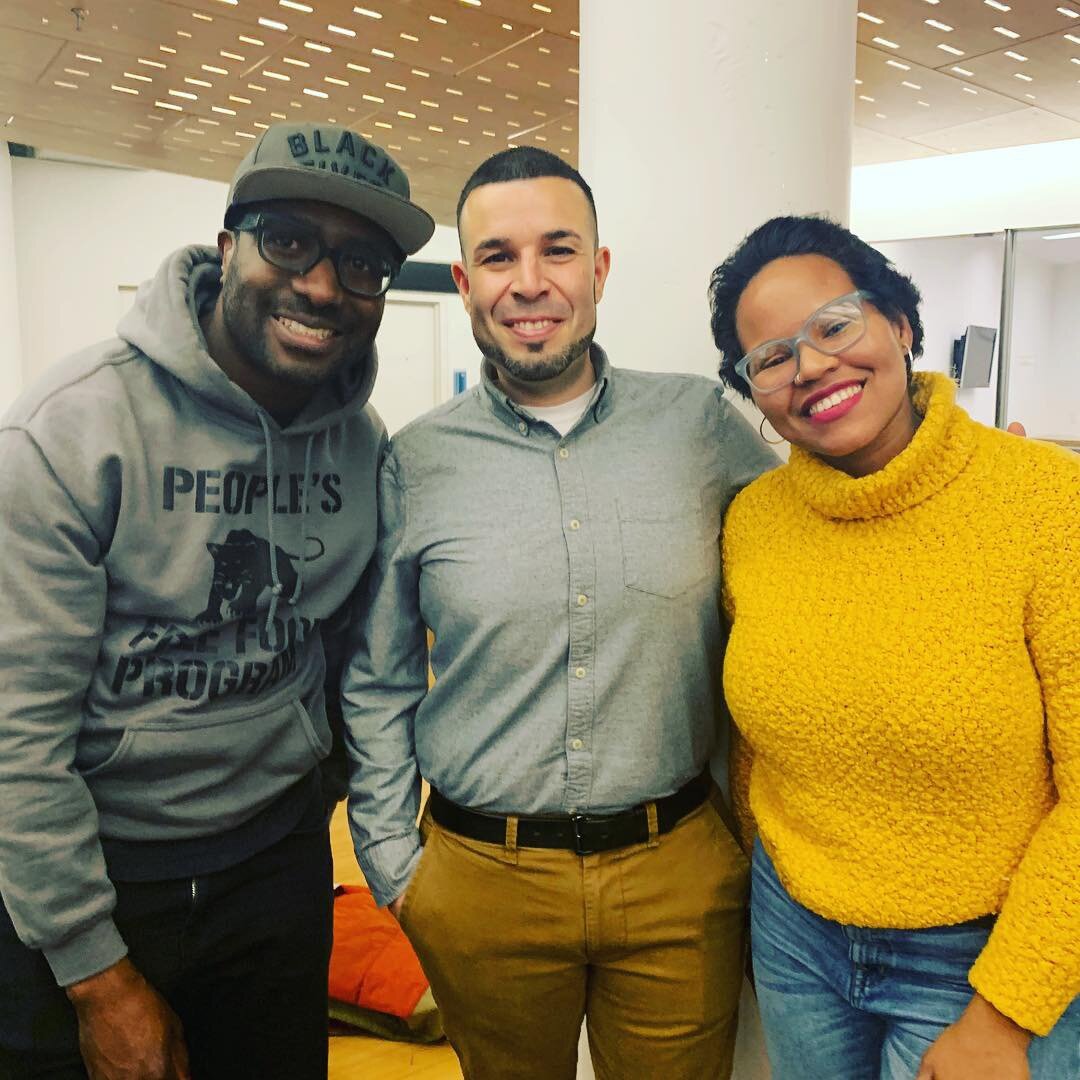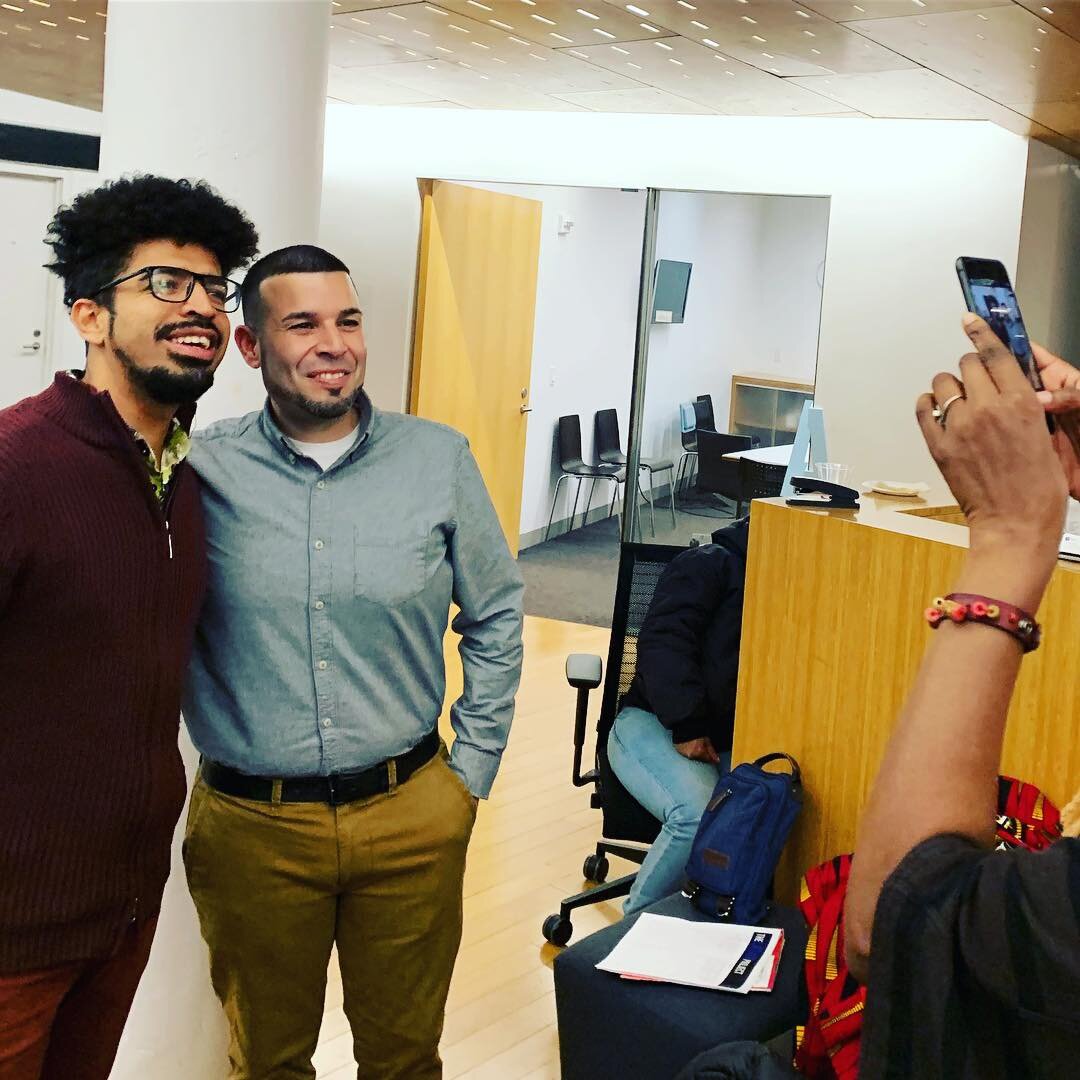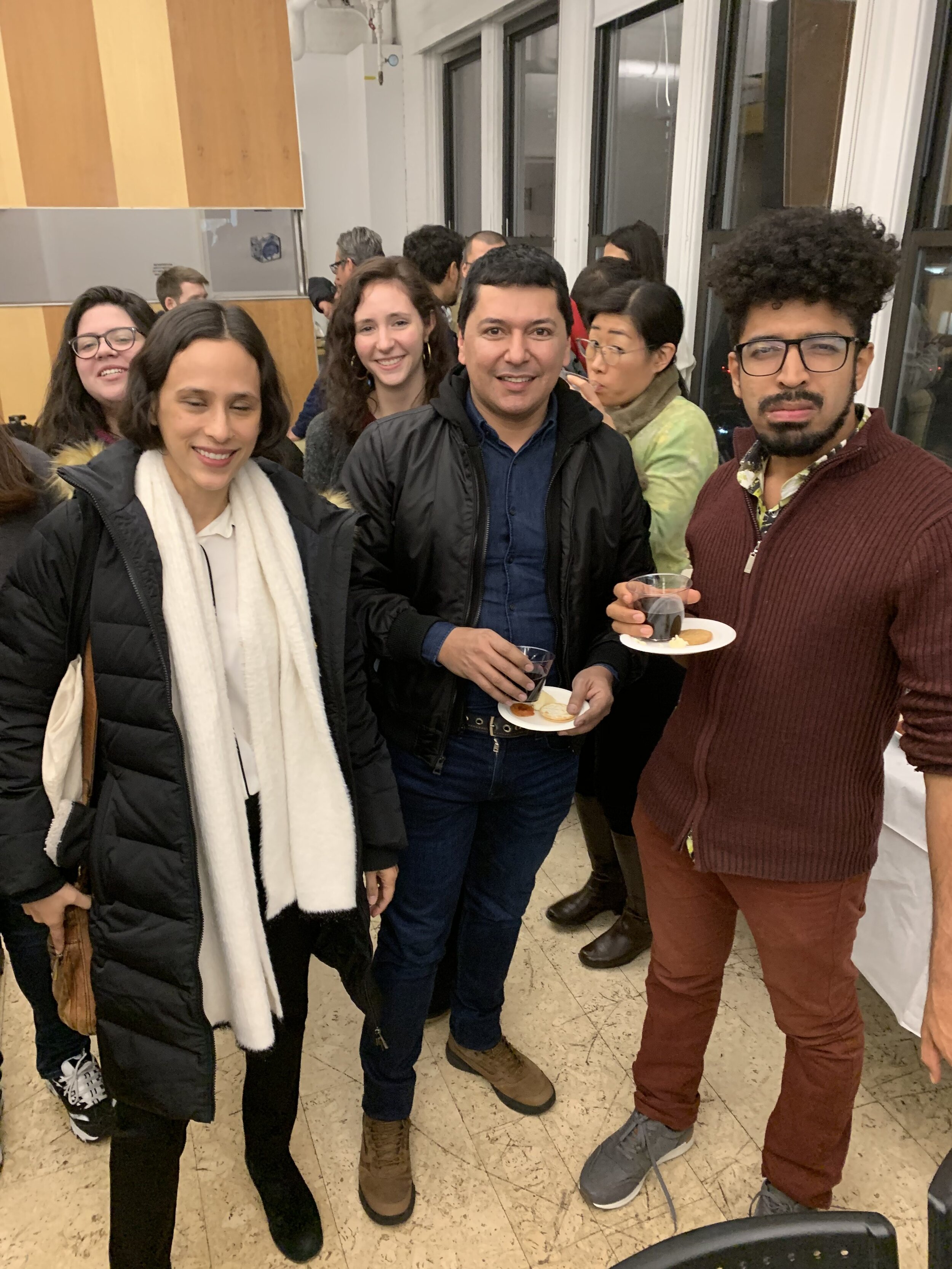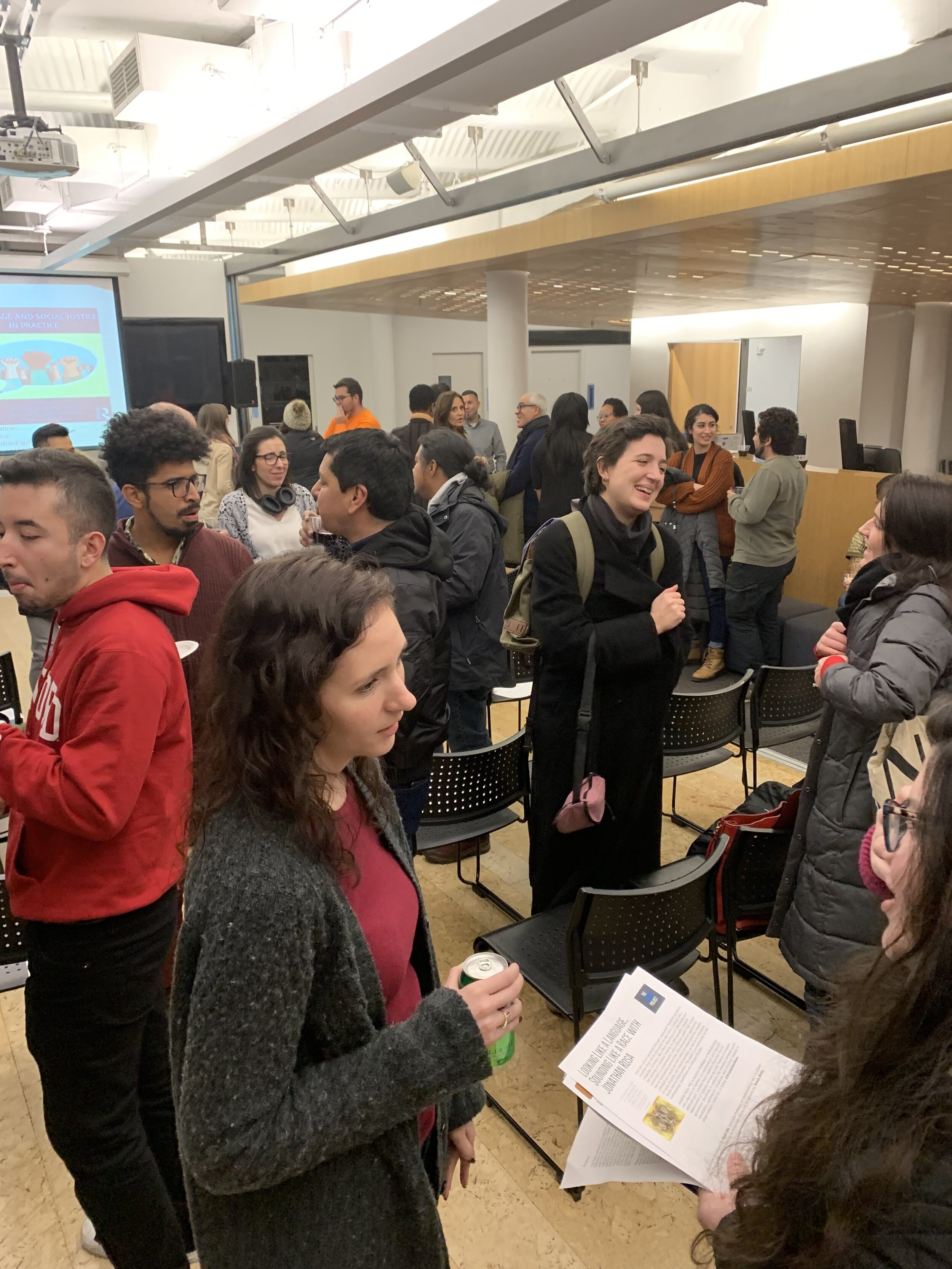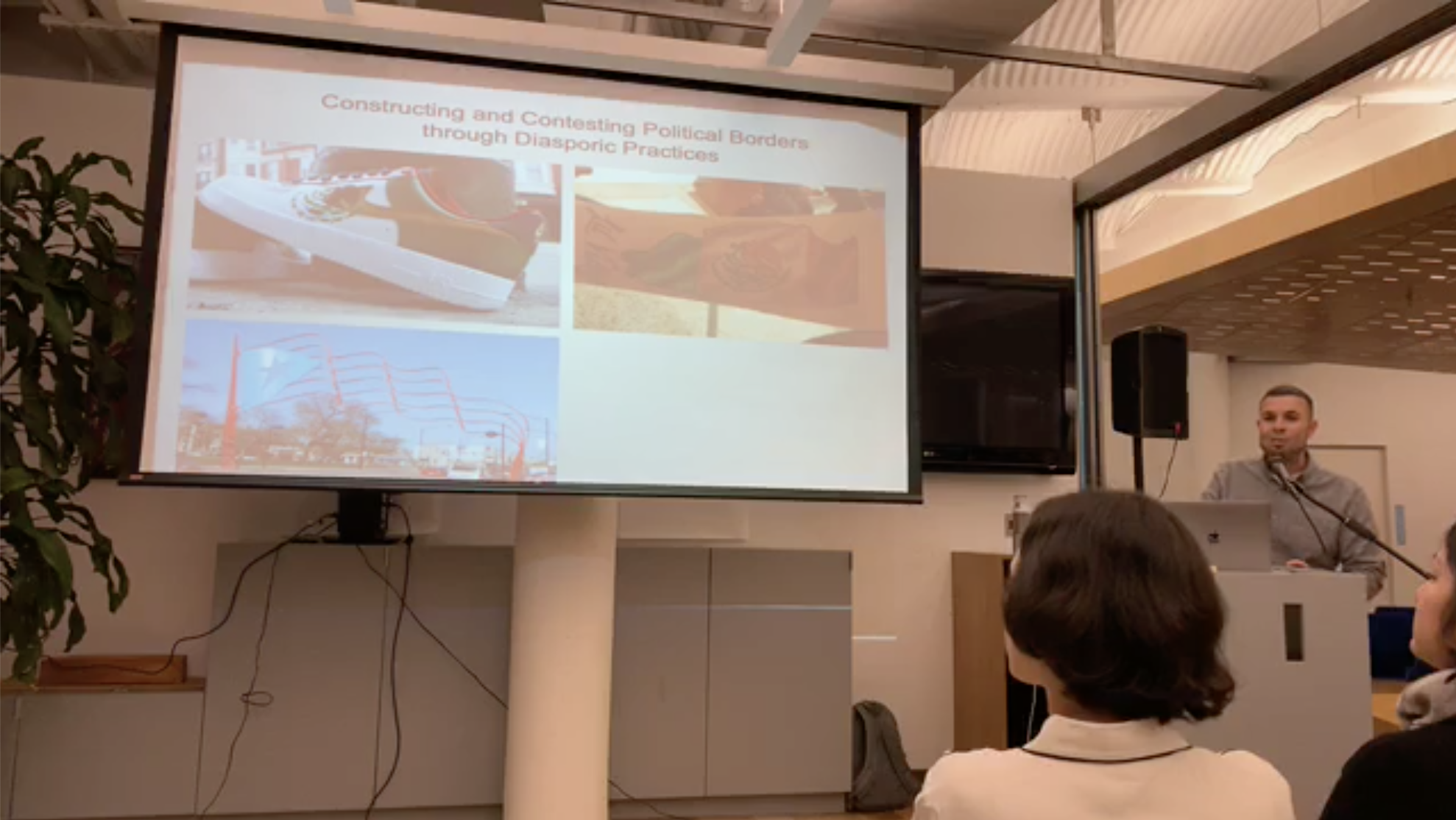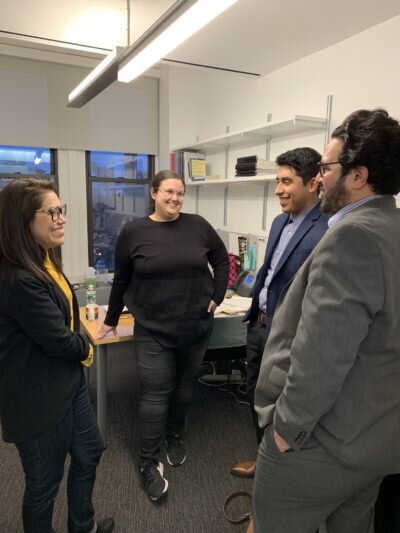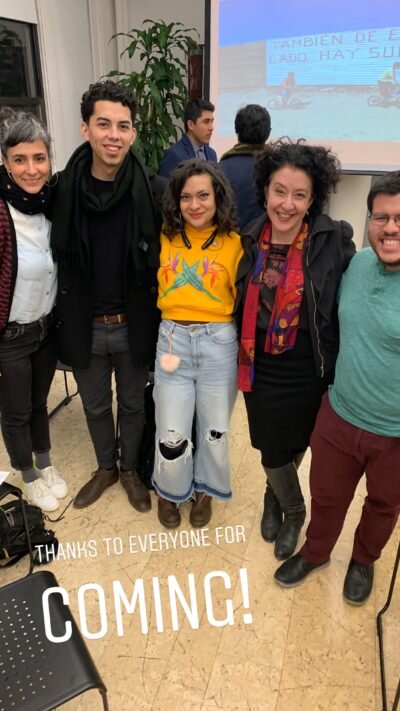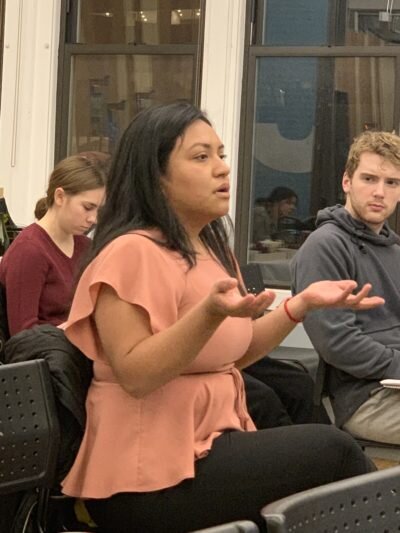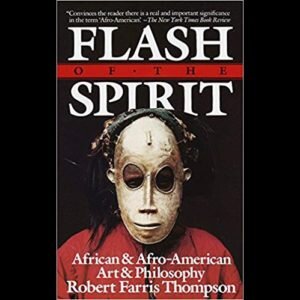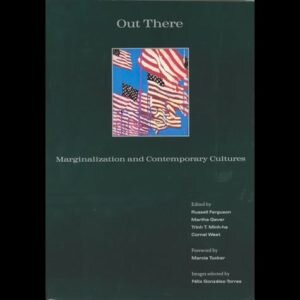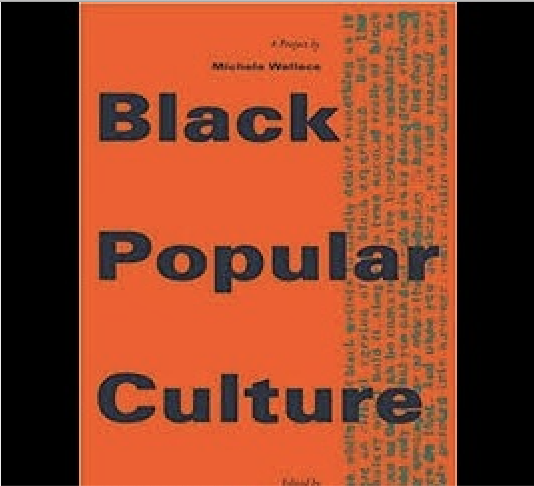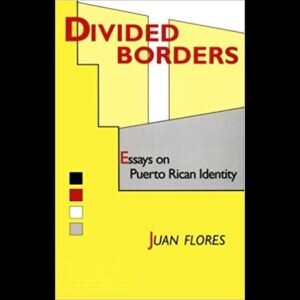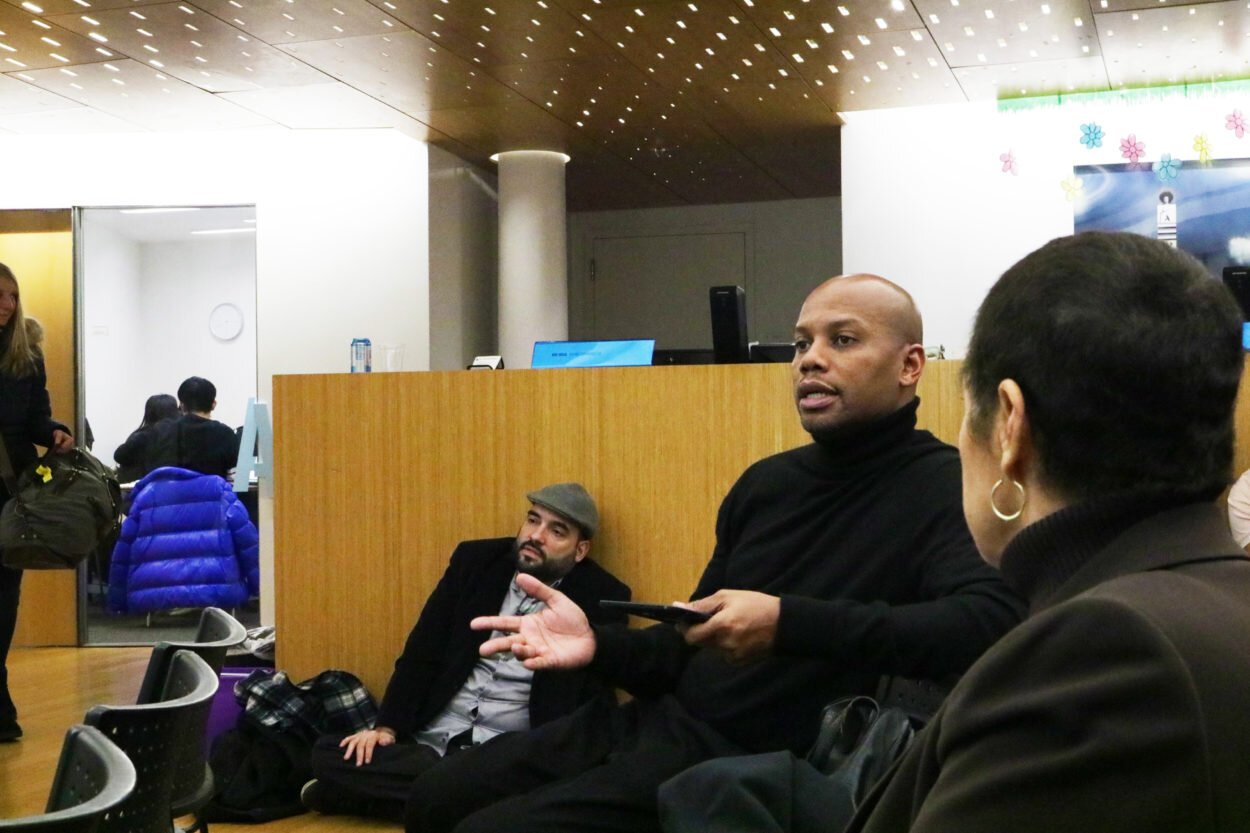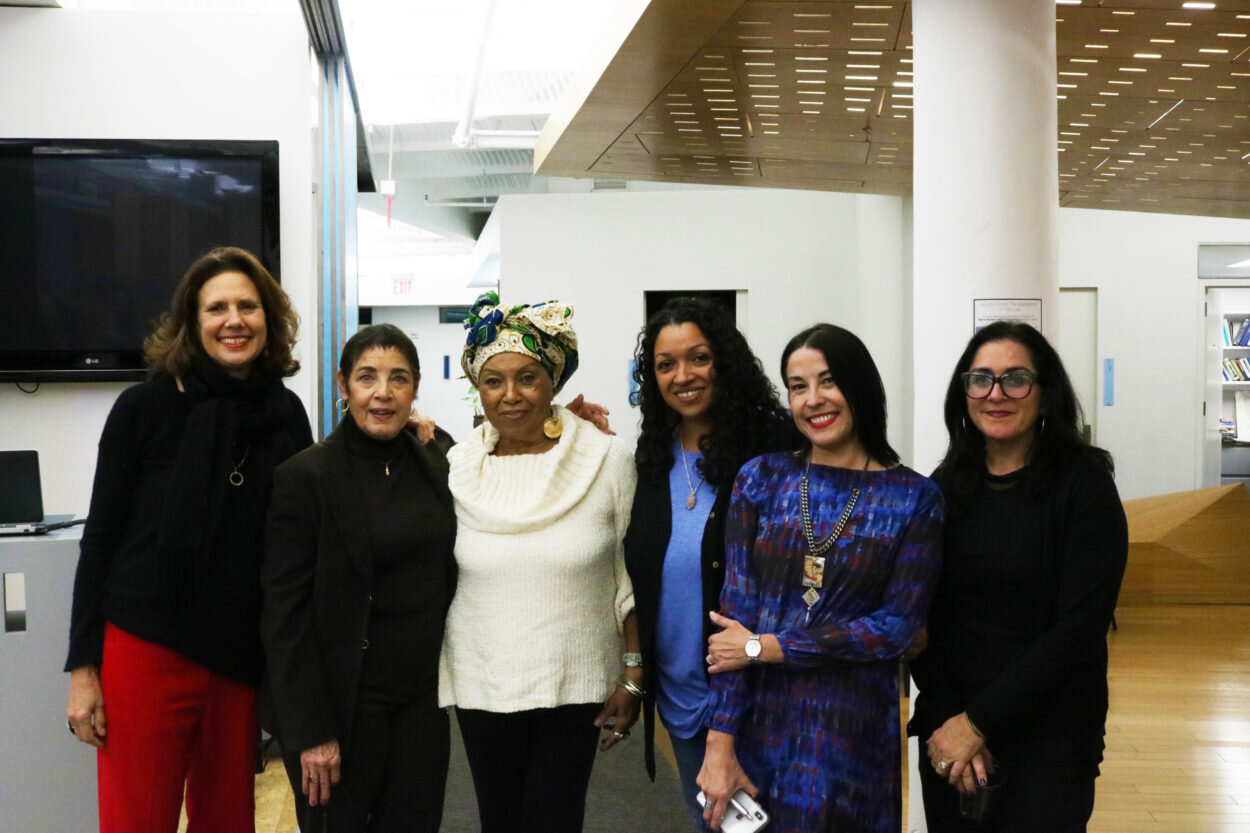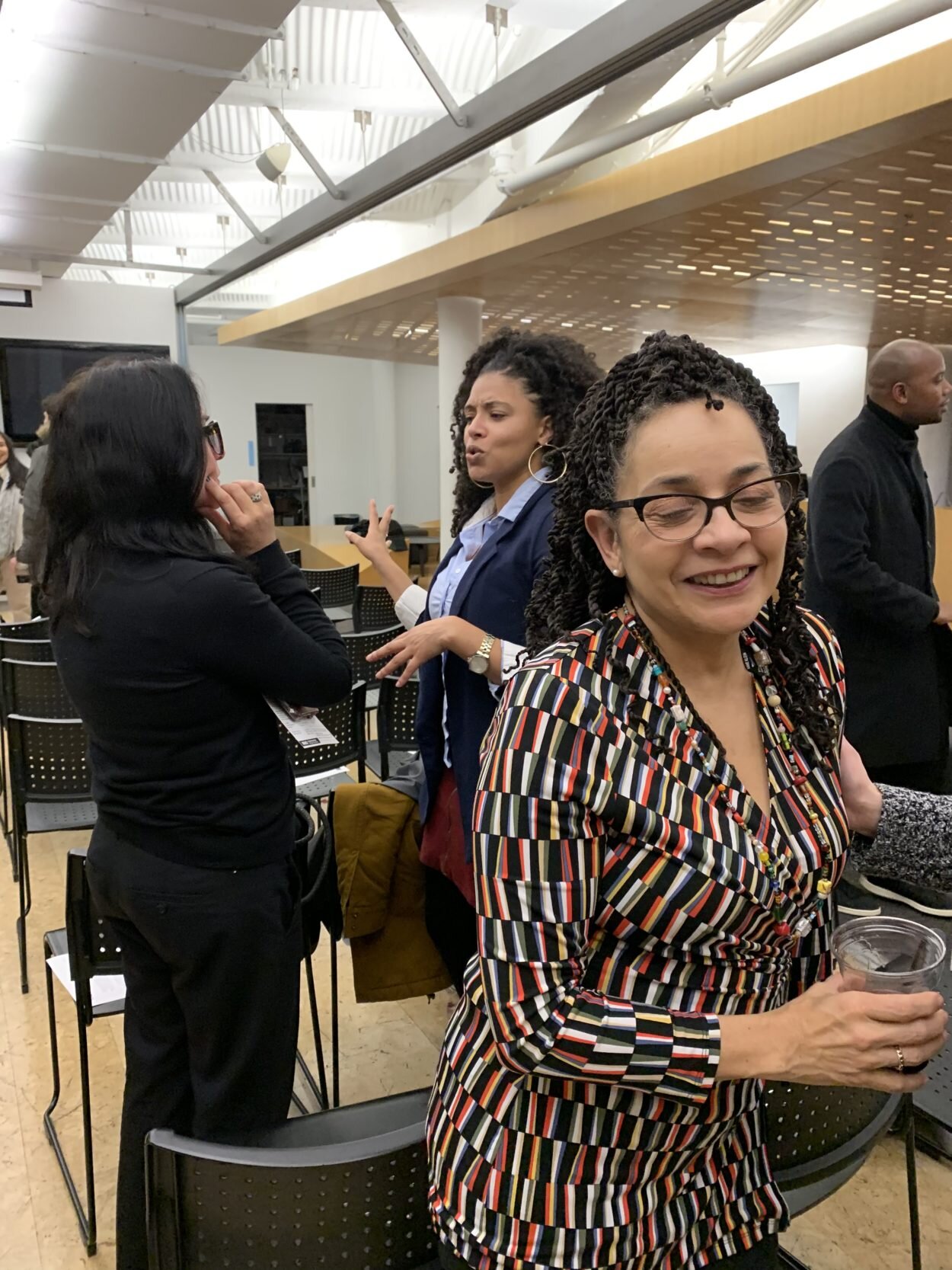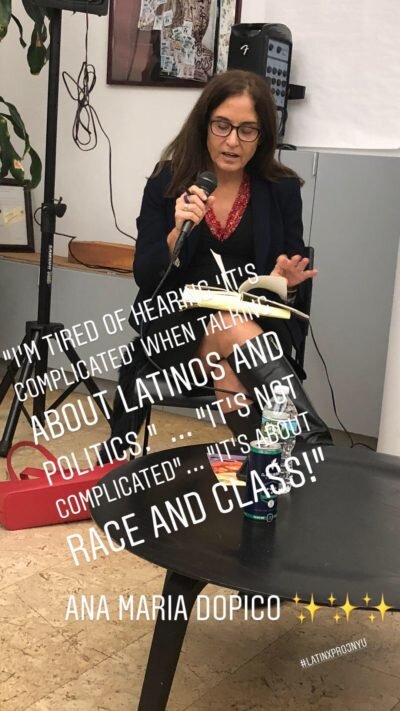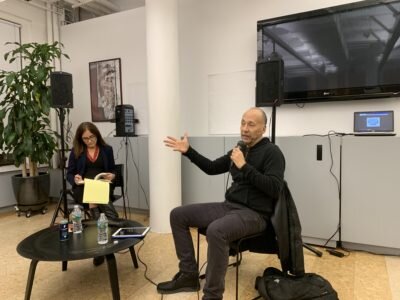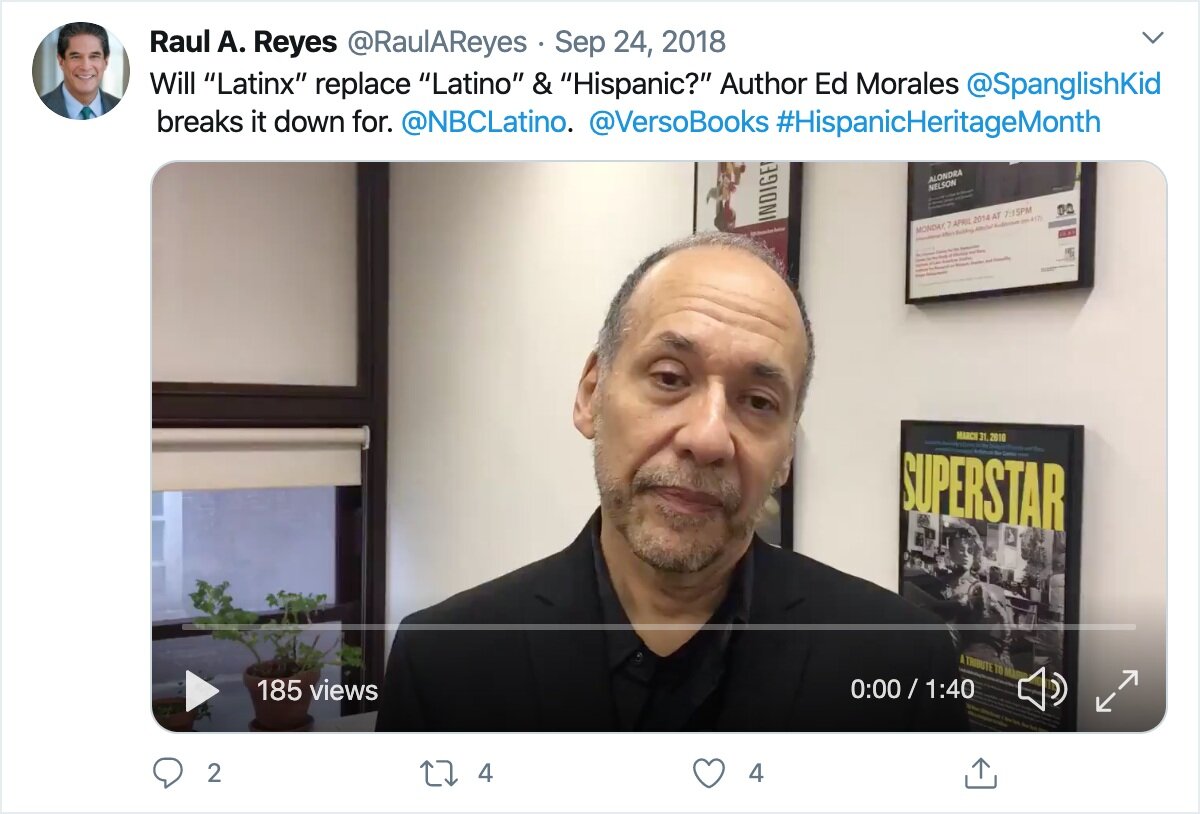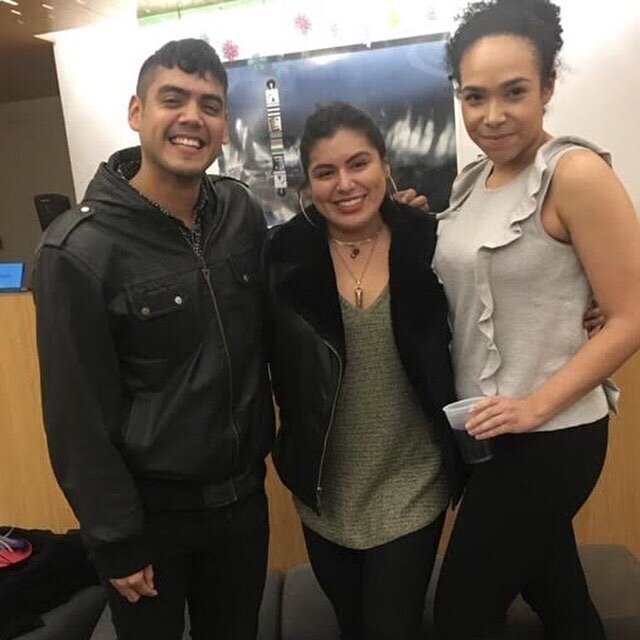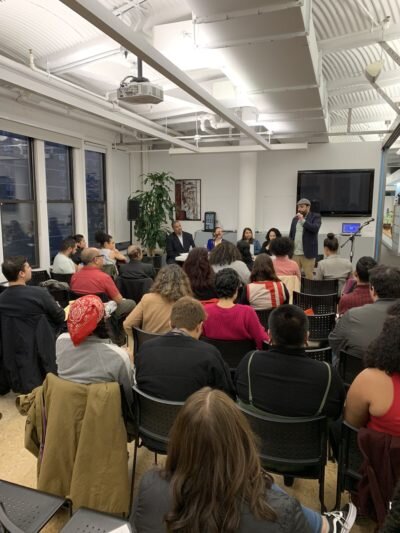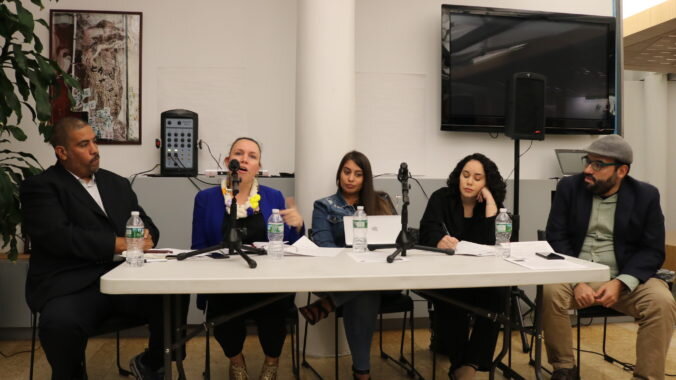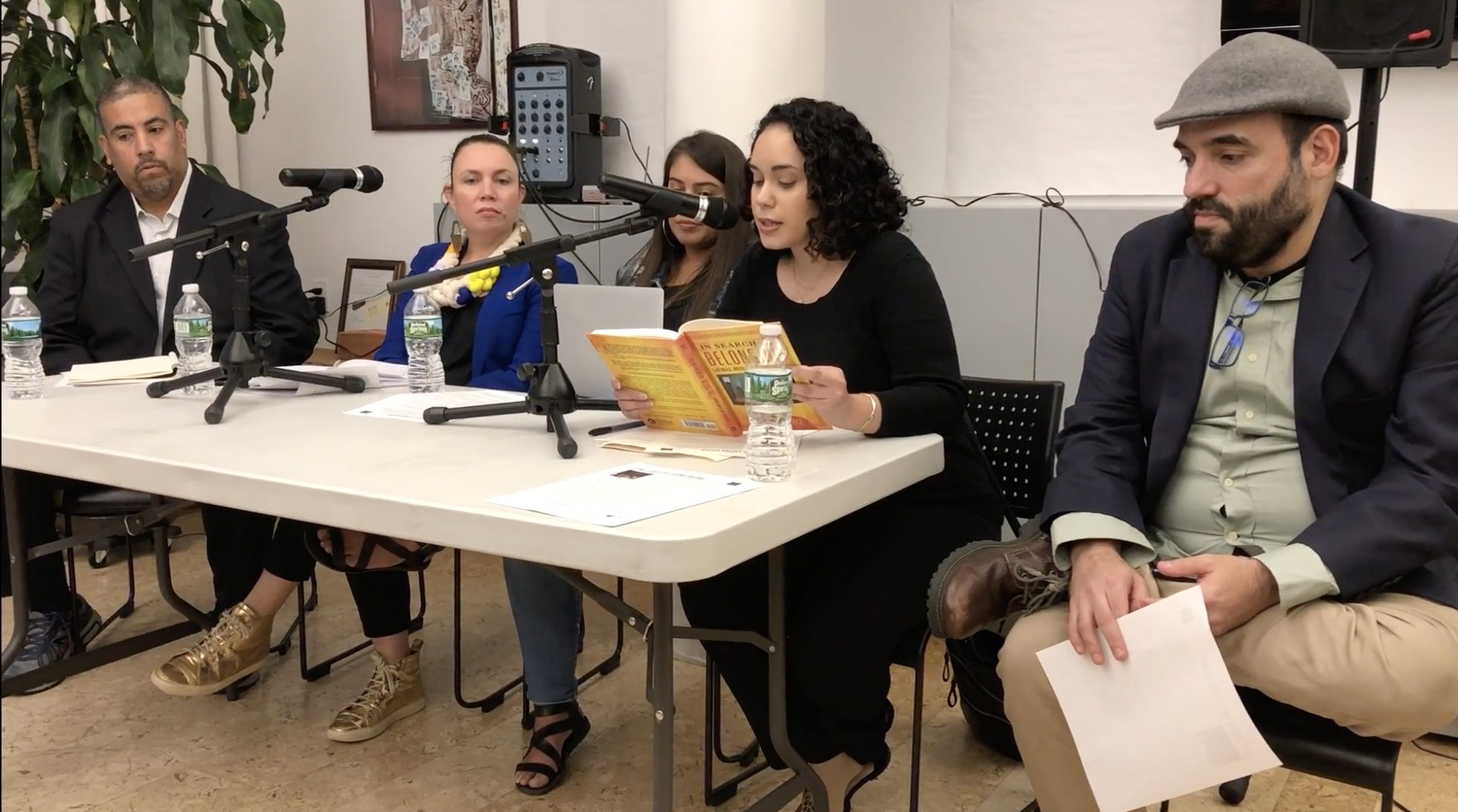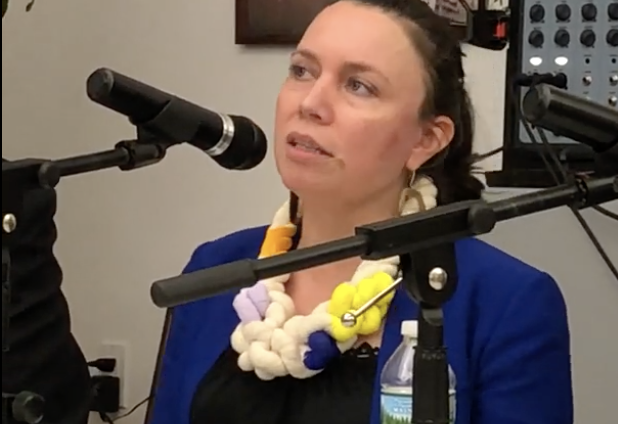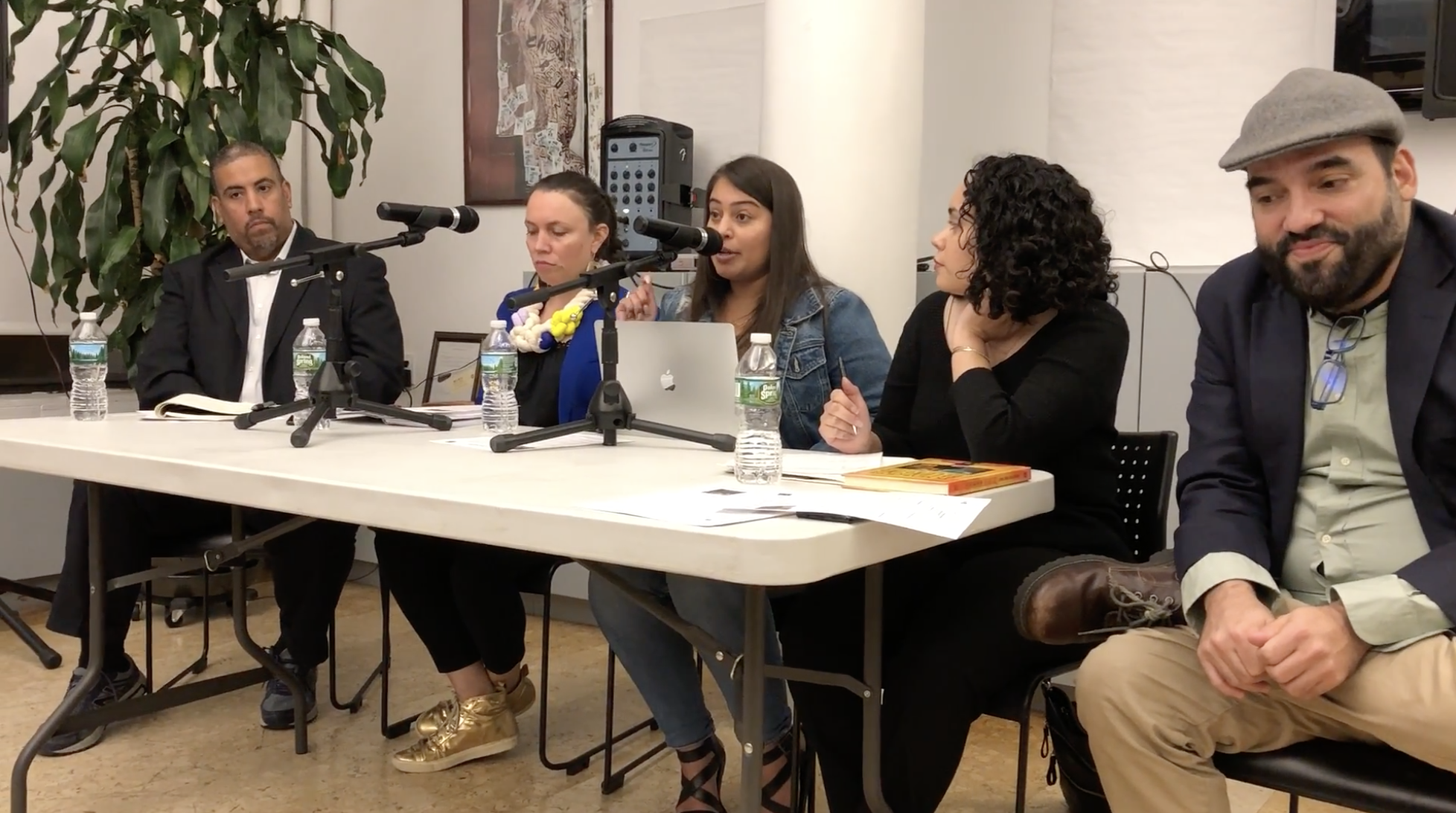
The Latinx Project’s End of Year Party
Event Recap
We finished up the year with our closing party at the PELEA exhibition this weekend. Uptown Vinyl Supreme played records and had us all dancing and celebrating the amazing year of programming. Our pop up chef Saydee Villarruel served tacos and we sold copies of our exhibition catalog.
We are thrilled to close out the year celebrating the successful culmination of our first exhibition, an artist in residence program, a conference on digitizing race that brought scholars together from across the U.S., and much more. We organized a working group of graduate students, and developed ten public programs to have forward-thinking conversations around Latinx scholarship, art, and activism! As part of our mission to keep events accessible to the wider public we have digitally archived as many events as possible such as the Art & Politics of Space Symposium which was live-streamed and posted on our site. We live-tweeted and wrote blogs about events like Ed Morales book discussion of Latinx: The New Force in American Politics, and the State of Latinx Media panel that brought writers and cultural critics together. Our Facebook page also has a video library of events including most panels from the Digitizing Race Conference. Keep us in mind for collaborations in Latinx studies. Follow us on Facebook, Twitter, and Instagram to keep up with new events.
We are excited to continue building with our community!
Thank you to all of the panelists, artists, scholars, and audiences who made 2019 a success!
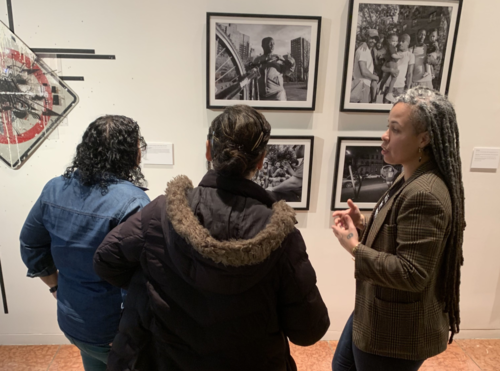
Final Curator Tour for PELEA
Join us for the final curatorial tour of our first exhibition PELEA – Visual Responses to Spacial Precarity. Tours will be provided at 3 and 4 pm
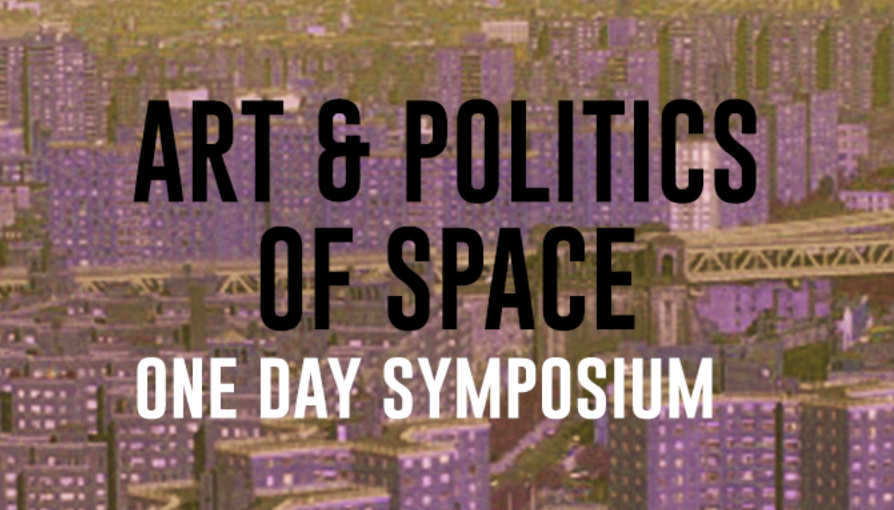
Art and the Politics of Space
A One Day Symposium featuring; Visual, Scholarly, and Activist Responses to Spatial Precarity
The Latinization of U.S. cities has been accompanied by the rapid displacement of Latinx people from their historical stronghold communities. Art and culture have been central to these processes, both to expediting gentrification and to strategies of resistance and Latinx placemaking. This is evident in the role art galleries and culture-based developments have played in the gentrification of urban cities as well as in the rise of Latinx artistic interventions that place culture and place-making at the forefront of their practice.
This one-day symposium gathered participating artists from PELEA Exhibit along with scholars who have been theorizing and acting through these processes in their work and practice. We welcomed the following speakers to speak at this symposium.
9:30 am Opening Remarks
10 am - 11:45 am Panel I: Thinking Through Capital and the Politics of Space 10 am - 11:45 am
Johana Londoño is an Assistant Professor in the Department of Latin American, the Caribbean, and US Latino Studies at the University at Albany, SUNY. She holds a Ph.D. in American Studies from NYU and a BFA from The Cooper Union. Her articles on Latinx urbanism appear in the edited volumes Latino Urbanism (NYU Press) and Race and Retail (Rutgers Press) and in several journals including American Quarterly, Social Semiotics, and Identities. Londoño is currently completing her book, Abstract Barrios: The Crises of Latinx Visibility in US Cities (under contract with Duke). Her research has benefited from the Princeton-Mellon Foundation Fellowship in Architecture, Urbanism, and Humanities, the Ford Foundation Dissertation, and Postdoctoral Fellowships, and the Northeast Consortium for Faculty Diversity, among other fellowships and grants. She serves on the Líderes Board of the LatinoJustice Organization (PRLDEF), a champion of Latinx civil rights, and is the co-chair of the Latina/o Studies Section of LASA. Londoño is a founding member of the US Colombianidades Editorial Collective. Lodoño’s Twitter and Instagram, @jlondonoo @jolondono
Zaire Zenit Dinzey-Flores is an Associate Professor in the Department of Latino and Caribbean Studies and the Department of Sociology at Rutgers, the State University of New Jersey. Her research focuses on understanding how urban space mediates community life and race, class, and social inequality.
Amanda Boston is a Provost’s Postdoctoral Fellow at New York University and an Assistant Professor/Faculty Fellow at New York University’s Marron Institute of Urban Management. Her research, writing, and teaching focus on twentieth-century African American urban history, politics, and popular culture, with an emphasis on the politics and culture of race in the post-civil rights era.
Her current projects focus on gentrification’s racial operations in post-1970 Brooklyn, New York, and their role in the making and unmaking of the borough’s black communities. Amanda holds a Ph.D. and a Master of Arts in Africana Studies from Brown University, as well as a Master of Arts in Political Science and a Bachelor of Arts in Political Science and African & African American Studies from Duke University. Boston’s Twitter, @atboston.
Miguel Robles-Durán is an urbanist, Associate Professor of Urbanism and member of the Parsons School of Design Graduate Urban Council in New York. He is a Senior fellow at “Civic City”, a post-graduate design/research program based at the Haute École d’Art et de Design (HEAD) Geneva, Switzerland and is a current fellow at the Montalvo Arts Center Sally & Don Lucas Artists Residency Program in Saratoga, California.
Noon - 1 pm Lunch and Break
1:30 pm - 3 pm Panel 2: Into Action
Shellyne Rodriguez a visual artist who works in multiple mediums to depict spaces and subjects engaged in strategies of survival against false hope, a device employed in the service of subjugation. She’s also an activist and organizer with Take Back the Bronx. Rodriguez has recently been commissioned by the city of New York for a permanent public sculpture, which will serve as a monument to the people of the Bronx.
Rigoberto Lara is from Sunset Park for a Liberated Future, an abolitionist, anti-capitalist collective based in Sunset Park, Brooklyn. We work with love to build community power and organize against policing displacement, and other forms of systemic oppression affecting our neighborhood.
Lena Melendez from the Northern Manhattan Not for Sale, a coalition fighting gentrification and to keep affordable housing.
3 pm - 4 pm Curator Tour of PELEA
4 pm - 5 pm Reception
This symposium was organized by The Latinx Project and co-sponsored by The Center for the Study of Africa and the African Diaspora (CSAAD), The Institute of African American Affairs/ Center for Black Visual Culture IAAA/CBVC, (CLACS) Center for Latin American and Caribbean Studies, Urban Democracy Lab, New York University Urban Initiative, and The KJCC (King Juan Carlos I of Spain Center).

¡Cuéntamelo! Oral Histories by LGBT Latino Immigrants Presentation and Drag Performance
A book performance with Reina de Aztlán, Alexandra Cruz Delight, and Juliana Delgado Lopera.
A night of celebration that featured performances, visual art, and readings from ¡Cuéntamelo! by Juliana Delgado Lopera. ¡Cuéntamelo! is a collection of oral histories and illustrations from LGBT Latinx immigrants who arrived in the States between the 80s and 90s. Performances were had by Alexandra Cruz Delight and Reina de Aztlán.
This event was co-sponsored by the New York University Center for the Study of Gender & Sexuality and The Latinx Project.
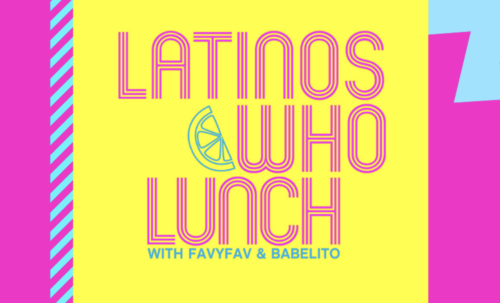
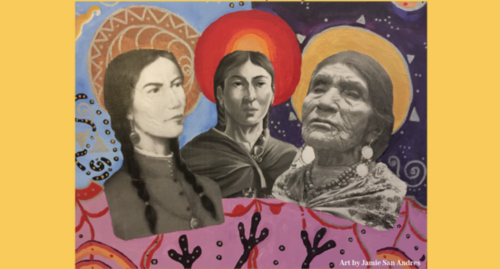
Warmipura (Among Womxn) – Art and Music of Abya Yala
The Runasimi Outreach Committee at New York University focuses on indigenous and Latinx culture, identity and folkways. They opened Warmipura (Among Womxn) – Art and Music of Abya Yala, was a night of live music, free food, spoken word, poetry, paintings, and more.

Digitizing Race – Making Latinxs in the 21st Century
Latinx have long been subject to misrepresentation and objectification in the media. What is happening in the digital realm? This one-day symposium explores the issues at play when they are turned into data, and what could be learned about contemporary racism by examining these processes.
We were especially interested in the technological mechanisms that manufacture representation; efforts to galvanize the tech industry’s various stakeholders towards creating more socially responsible apps and machine learning tools; and exploring how digital workers and activists are using digital technology to empower communities.
This event was open to the public.
Program
Participants
Graduate student Marcel Salas, Professors Cecilia Marquez, Cristina Beltrán, Urayoán Noel, media practitioners, among others.
Keynotes
Héctor Beltrán, Assistant Professor at MIT, author of the forthcoming Hacking Imaginaries: Full-Stack Ethnography Across the Techno-Borderlands; and Ruha Benjamin, Associate Professor of African American Studies, Princeton University, and author of the forthcoming book, Race After Technology.
Event Recap
The TLP Digitizing Race Conference last week was a huge success with scholars coming from UPenn, Cornell, UMichigan, Princeton, MIT, George WashingtonU, UCLA, Norte Dame, Arizona, Puerto Rico, UT Austin, Bucknell, Williams College, and Pace University! The panels were informative and helped make so many connections within the field of critical digital studies.
Our first keynote was Héctor Beltrán, Assistant Professor at MIT, author of the forthcoming Hacking Imaginaries: Full-Stack Ethnography Across the Techno-Borderlands, who offered us a few takeaways with his presentation. They came in the form of policy recommendations from a policy brief titled Latina/os and Tech: Toward a Holistic Approach for Diversifying Silicon Valley, a result of research and a conference held as part of the Latinxs and Tech Initiative. Listed below are five of the recommendations
The political economy that undergirds issues of transnationalism, hybrid identities, and coalition-building are discussed and analyzed thoroughly in relevant humanities and social science courses. Prioritize these courses as part of STEM curriculum.
The onus should not be on talented young people to have to decide between their communities and their “success.” Tech companies should provide the time and resources for employees, especially people of color with “insider’s knowledge,” to connect with community leaders in order to help develop these crucial programs.
Protect spaces for people from underrepresented groups to gather and support each other. Provide opportunities for these different groups to spend time with each other, learn from one another, and strategize together to build better/ alternative futures. Encourage members of overrepresented groups to join these dialogues, if they are willing to let others lead.
Listen and learn from leaders already doing the work of diversity in related movements, who aren’t always specifically in tech or in your field. We need computer science students who read broadly across social science and humanities to unpack institutional racism, just like we need our humanities majors to take computation courses in order to unpack coding logic.
Whether an empowered coder superhero or an empowered blue-collar worker, the coding hero/worker, along with all Silicon Valley workers (“direct” and in supporting roles) deserves a living wage.
Our second keynote who jumpstarted the full day of presentations was brilliant scholar Ruha Benjamin, Associate Professor of African American Studies at Princeton University, and her presentation was ‘The New Jim Code? Race, Carceral Technoscience, and Liberatory Imagination in Everyday Life.’ Her question asked was, “How are novel technologies deployed in carceral approaches to governing life well beyond the domain of policing? But also, to what end do we imagine? How can the transformation of our political, cultural and social norms work towards collective forms of freedom? And how might technoscience be appropriated and reimagined for more liberatory ends?”
She continued to say, “The task as I see it is not only to resist discriminatory design to the extent possible but to work with others to imagine and create alternatives to the socio-techno quo, as part of a larger struggle to materialize collective freedoms and flourishing.”
Books Referenced by Ruha Benjamin
Race After the Internet Edited by Lisa Nakamura and Peter Chow-White
TechniColor, Race Technology and Everyday Life Edited by Alondra Nelson, Thuy Linh Nguyen Tu, Alicia Headlam Hines
Cyber Racism White Supremacy Online and the New Attack on Civil Rights by Jesse Daniels
Dark Matters: On the Surveillance of Blackness by Simone Browne
Digital Diaspora: A Race for Cyberspace by Anna Everett
The Social Life of DNA by Alondra Nelson
Cybertypes by Lisa Nakamura
Algorithms of Oppression by Safiya Umoja Noble
Thanks for joining us!
Conference Videos

Brujos Screening and Discussion with the Creators
The Latinx Project co-sponsored a screening of the web-tv series Brujos followed by a discussion with Ricardo Gamboa, Isaac Gomez, and Justin Ignatius Mitchell on re-imagining political television in the digital age. Students discussed how one makes political media content outside of the world of cable and network TV.
Brujos is a radically-politicized, queer-of-color web series following four gay Latino doctoral students that are also witches as they try and survive the semester and a witch hunt led by the straight, wealthy, white male descendants of the first New World colonizers. Brujos’ experimental approach to production and radical ethos has garnered the show significant recognition and a cult following.
This screening was co-sponsored by the New York University Center for the Study of Gender & Sexuality and The Latinx Project.

Latina Music Critics at Work
Feminist Latina scholars of music, Alexandra Vazquez, Licia Fiol-Matta, and Deborah Vargas proposed departure points for theorizing music made across the Americas. Together with the panelists, the audience was invited to take in sounds across various Latinate genres and geographies; to imagine what they demanded of listening practices and what they offered to counter public collectives, and to experience the wonder of being with music with a primarily feminist ethos. The panelists explored and advocated for the “impermissible” practices of Latina feminist music criticism, including experimental forms of writing meant to blow open the constraints imposed by “regional” thinking and to play with materials suspicious of (and to) archives.
Professor Alexandra Vazquez of New York University’s Department of Performance Studies and author of Listening in Detail: Performances of Cuban Music, moderated and participated in this exciting conversation. She was be joined by Professor Licia Fiol-Matta of New York University’s Department of Spanish and Portuguese, author of The Great Female Singer: Gender and Voice in Puerto Rican Music, and Professor Deborah Vargas, Henry T Rutgers Term Chair in Comparative Sexuality, Gender and Race at Rutgers, author of Dissonant Divas in Chicana Music.
This event was free, open to the public, co-sponsored by The Latinx Project and was a joint project of the music department at New York University’s College of Arts and Science, Steinhardt School of Culture, Education and Human Development, Tisch School of the Arts, and the AMS.
Event Recap
On February 21st, 2019, The Latinx Project co-sponsored an evening with three amazing Latina music critics Alexandra Vazquez, Licia Fiol-Matta, and Deborah Vargas; who taught us how to engage in feminist listening practices. The critics shared some favorite classics that challenged stereotypical ideas about what Latinx music feels and sounds like.

PELEA – Visual Responses to Spatial Precarity (Opening)
Our first exhibition, PELEA – Visual Responses to Spatial Precarity explores how artists respond to displacement through their work. This practice provides a platform for examining visual strategies among contemporary Latinx artists.
The show was curated by our inaugural Artist in Residence Shellyne Rodriguez and The Latinx Project’s curatorial team. The opening was February 15th, 2019 from 6 to 8 pm at The King Juan Carlos Center. The show was open to the public and on view until May 3rd, 2019, gallery hours Monday through Friday from 11 am to 7 pm.
Featuring
Melissa Calderón, Roy Baizan, Alicia Grullón, Groana Melendez, Carlos Jesús Martínez Domínguez, Shellyne Rodriguez, Francisca Benítez, Mi Casa No es Su Casa, and Jehdy Vargas.
Artists
Calderón -born and bred in the Bronx- has exhibited her work at El Museo del Barrio, The Bronx Museum of the Arts, The Queens Museum, Socrates Sculpture Park, The Portland Museum of Art, Pioneer Works, the Schomburg Center for Research in Black Culture, Arsenal de la Puntilla and Galeria 20/20 in Puerto Rico, Art in Odd Places Festival, and Smack Mellon, among others.
She is a PEPATIAN artist; a South Bronx-based organization dedicated to creating, producing and supporting contemporary multi-disciplinary art by Latino and Bronx-based artists founded by visual artist Pepon Osorio and dance/choreographer Merian Soto. Calderón continues to be an advocate and activist for conscious arts revitalization in the South Bronx. She has been included in such books as Frescos, 50 contemporary artists from Puerto Rico, Strange Material: Storytelling through Textile, and EMERGENCY INDEX VOL. 4 ‘s annual performance publication.
Roy Baizan
Baizan is a Chicanx documentary photographer and arts educator from the Bronx. His work focuses on community, identity, and family. Shortly after graduating from the International Center of Photography’s free 10-week program at The Point- ICP @ THE POINT, he became a Teaching Assistant where he taught photography to the youth in the Bronx and Manhattan.
He has since worked for The Bronx Documentary Center, The Point, The Bronx River Art Center, and ICP continuing to pass forward the opportunities that were awarded to him through photography classes. Recently, he graduated from the Visual Journalism and Documentary Practice Program at the International Center of Photography with the support of the Wall Street Journal Scholarship and Board of Directors Scholarship. His work has been featured in The New York Times, The Gothamist, America Magazine, and Riverdale Press.
Alicia Grullón moves between performance, video, and photography, channeling her interdisciplinary approach towards critiques on the politics of presence, an argument for the inclusion of disenfranchised communities in political and social spheres.
Grullón’s works have been shown in numerous group exhibitions such as The 8th Floor, Franklin Furnace Archives, Bronx Museum of the Arts, BRIC House for Arts and Media, School of Visual Arts, El Museo del Barrio, Columbia University, Socrates Sculpture Park, Performa 11, and Art in Odd Places.
She has received grants from the Puffin Foundation, Bronx Council on the Arts, the Department of Cultural Affairs of the City of New York, and Franklin Furnace Archives. She has participated in residencies in the United States and Korea among them New York University’s Hemispheric Institute of Performance and Politics. She has presented for the 2017 Whitney Biennial with Occupy Museums, Creative Time Summit 2015, The Royal College of Art, United States Association for Art Educators, School of Visual Arts, and the American Museum of Natural History.
Grullón’s work has been written about in the New York Times, Village Voice, Hyperallergic, Creative Time Reports, Art Fag City, ArtNet News, Blouin Artinfo, New York Daily News, The Columbia Spectator, and Brooklyn Press.
Groana Melendez is a lens-based artist whose work focuses on the representation of marginalized peoples. She was raised between New York City and Santo Domingo and holds a Master of Fine Arts in Advanced Photographic Studies from the International Center of Photography-Bard Program. She currently works and lives in the Bronx.
Melendez graduated Magna Cum Laude with a Bachelor of Fine Arts in Art Photography from Syracuse University. She has participated in group exhibits in China and Guadalupe, as well as solo shows in the New York Public Library, The City University of New York, and the International Center of Photography’s Bard’s studio in Queens.
CARIBBEAN NEW YORKER, FATHER, PARTNER, ATHEIST ON SOME DAYS, NON THEIST AGNOSTIC ON OTHERS, APOSTATE, LEFTEST, SOCIALIST, AGITATOR, ETHICAL POLYAMORIST, OCD HAVING, HS DROPOUT, GED HOLDER, AUTODIDACT, EDUCATOR, DEBATER, WHITE PEOPLE FEARING, ALL PEOPLE LOVING, QUEERISH?, LACTOSE INTOLERANT HAAGEN-DAZS COFFEE ICE CREAM DEVOURING, MARIJUANA ADVOCATING, HIP HOP, SNEAKER, COMIC AND SCI-FI LOVING NON LATINO/A/X IDENTIFYING DOMINICAN PUERTO RICAN INTERDISCIPLINARY ARTIST BORN ON A MILITARY BASE IN NORTH CAROLINA IN 1976. CARLOS JESUS MARTINEZ DOMINGUEZ A.K.A FEEGZ, FIGARO & FIRO173 HAS EXHIBITED, TAUGHT, SPOKEN, CURATED AND LEARNED IN A S_IT LOAD OF INSTITUTIONS NATIONALLY AND INTERNATIONALLY. WASHINGTON HEIGHTS NYC SINCE 84.
“MY WORK CONVEYS MY ANXIETY AND THRILL REGARDING HISTORY, HOW THAT HISTORY MANIFESTS IN THE PRESENT, AND PRESENTS IMPLICATIONS FOR THE FUTURE. “
Shellyne Rodriguez is a visual artist who works in multiple mediums to depict spaces and subjects engaged in strategies of survival against false hope, a device employed in the service of subjugation. These psychological and emotive inquiries put the Baroque in contact with a Decoloniality rooted in the traditions of hip hop culture. Her work utilizes text, drawing, painting, found materials, and sculpture to emphasize her ideas.
Shellyne graduated with a Bachelor of Fine Arts in Visual & Critical Studies From the School of Visual Arts and a Master of Fine Arts in Fine Art from CUNY Hunter College. She has had her work and projects exhibited at El Museo del Barrio, Queens Museum, New Museum, and her work has recently been commissioned by the city of New York for a permanent public sculpture, which will serve as a monument to the people of the Bronx.
Francisca Benítez (b.1974) is an artist born and raised in Chile, living and working in New York since 1998. Her practice delves into the intersections between space, politics, and language, working with different mediums including drawing, video, photography, performance, and music.
Her work has recently been shown at the New Britain Museum of American Art, the XII Havana Biennial in Cuba, the Jeu de Paume in Paris, France, and El Museo del Barrio in New York. She graduated as an architect from the University of Chile (1998) and a Master of Fine Arts from Hunter College CUNY (2007).
Jehdy Vargas, a New York-based artist, seeks to link the past to the contemporary as she draws on her personal experience. In this process, she hopes to engage in a transformative act which purges the present of its deep psychic impact, somewhat akin to a therapeutic experience.
A person’s history fuses with their present circumstances on many levels, carrying a deep emotional impact. Through reflecting on the past, integrating it into the present, she draws the viewer into this psychic drama, hoping to relieve it of its limiting effects. She utilizes a journalistic approach to her work which involves shooting, printing, pasting, scanning, painting, and repeating this process until the primary mechanic image is obscured, potentially lost. Expanding beyond the use of canvas, she utilizes found objects which help define the image. Through this act, Vargas hopes to blur the line between past and present, create a transfigurative process.
Mi Casa No es Su Casa, a political art project by New Yorkers for New Yorkers, based out of the Mayday Space in Bushwick, using art + direct action to build a visible resistance to gentrification and displacement in NYC and beyond. #DecolonizeTheHood
The exhibition was co-sponsored by New York University’s KJCC (The King Juan Carlos I of Spain Center).
Event Recap
The opening last Friday was a huge success with hundreds of people coming to celebrate our inaugural exhibition, PELEA – Visual Responses to Spatial Precarity. Many of the artists were in attendance and talked about their work with many members of the community. KJCC Director, Ana Dopico welcomed us to space, and our founder Arlene Dávila said a few words as well as our artist-in-residence and co-curator of PELEA, Shellyne Rodriguez.
“Immediately I thought I don’t want to do a cliche political art show about gentrification. Often what happens when you are a person who takes a radical stance politically, your arguments get robbed of their nuance. So, I wanted to take a poetic approach at thinking about some of this ‘pelea’ or fight that we have in our communities and think about them politically in this space.“ - Shellyne Rodriguez

Afro-Latinidad in the African Diaspora, a Black History Month Series
Afro-Latinidad in the African Diaspora is part of the Black History Month Series ‘Black Experience in the Americas.’
With the onset of globalization and the consistent flow of people from Latin America to the United States, Afro-Latinx identity has gained visibility in public discourse. In turn, Black communities revisit the questions of the diaspora, race, and Latinidad in the Americas.
Dr. Will Guzmán, Dr. Jillian Báez, Dr. Adedamola Osinulu, and Dr. Donovan Ramon discussed the intersections and emergence of Afro-Latinidad in the U.S., Latin America, the complex meanings of identity and belonging in metropolises like New York City.
Dr. Will Guzmán is the Director of the Lee Hagan Africana Studies at New Jersey City University. The Lee Hagan Africana Studies Center promotes academic excellence and social responsibility among faculty, students and surrounding community about issues necessary to the empowerment of peoples across the African Diaspora. Dr. Guzmán’s research interests are African American history, Afro-Latinx history, Caribbean and Latin American history, and United States history. His book, Civil Rights in the Texas Borderlands: Dr. Lawrence A. Nixon and Black Activism; won the Calvin Smith Book Prize. Previously, Dr. Guzmán served as an assistant professor in the Department of History and African American Studies at Florida A&M University and Director of the Office of Black Diasporan Culture at FAMU.
Dr. Donavan Ramon is a professor at Whitney Young School of Honors and Liberal Studies at Kentucky State University. A native of Harlem who is Jamaican and Honduran, his work focuses on racial passing.
Dr. Jillian Báez is an associate professor in The Department of Media Culture at The CUNY, College of Staten Island. She specializes in Latina/o media, audience studies, transnational feminisms, and media literacy. Dr. Báez is the General Editor of WSQ (formerly Women’s Studies Quarterly). Her research has been supported by the Ford Foundation and Social Science Research Council. Prior to her appointment at the College of Staten Island, Dr. Báez was a Postdoctoral Fellow at the University of Michigan and a Visiting Assistant Professor at Williams College.
Dr. Adedamola Osinulu is an assistant professor of Global Liberal Studies at New York University where he investigates and teaches about African cultural production. His current research examines how Nigerian Pentecostals conceive of and make space on the outskirts of the city of Lagos. Osinulu earned his Ph.D. from UCLA’s Department of World Arts and Cultures and has held a fellowship with the Michigan Society of Fellows, University of Michigan.
The event was organized by Liberal Arts Professor Kaia Shivers and co-sponsored by The Latinx Project.

Book Discussion – Looking Like a Language, Sounding Like a Race by Jonathan Rosa
How are Latinxs racialized through language? Stanford professor, Jonathan Rosa discussed his new book Looking Like a Language, Sounding Like a Race: Raciolinguistic Ideologies and the Learning of Latinidad. Drawing on ethnographic research conducted in a predominantly Latinx Chicago public high school and its surrounding communities, this presentation approached Latinidad as a crucial site from which to understand the creation of racial, linguistic, and national borders, as well as to reimagine worlds beyond them.
Jonathan Rosa, Ph.D., is an Assistant Professor of Anthropology and Linguistics at Stanford. As a sociocultural and linguistic anthropologist, Rosa’s research theorizes the co-naturalization of language and race as a key feature of modern governance. Specifically, he analyzes the interplay between youth socialization, raciolinguistic formations, and structural inequity in urban contexts.
Rosa was introduced by Sonia Das, Associate Professor of Anthropology and Co-Editor-In-Chief of Journal of Linguistic Anthropology. There were also remarks by Renee Blake, Director of Africana Studies. The event was co-sponsored by The Anthropology and Africana Studies Department.
Event Recap
Jonathan Rosa visited us from Stanford to talk about his now sold-out book Looking like a Language, Sounding like a Race Raciolinguistic Ideologies and the Learning of Latinidad. He took us through a presentation about his research including two years of ethnographic research studying a Chicago high school where most of the student body were Latinx, mainly Puerto Rican, and Mexican descent.
Rosa’s presentation was dynamic, informative, and did a fantastic job setting up current presumed ideas about bilingualism, multilingualism, and arguments for their advocacy and non-advocacy. Rosa let us hear a beautiful recording of Toni Morrison reciting a statement that helped him analyze issues inherent in believing bilingualism or multilingualism is the key to acceptance, overcoming racism, or even assimilation. As Morrison outlines, the standards for being seen as equal will always change. The problem is much larger and stigmatization is part of a much broader system of longstanding colonization.
“The function, the very serious function of racism is a distraction. It keeps you from doing your work. It keeps you explaining, over and over again, your reason for being. Somebody says you have no language and you spend twenty years proving that you do. Somebody says your head isn’t shaped properly so you have scientists working on the fact that it is. Somebody says you have no art, so you dredge that up. Somebody says you have no kingdoms, so you dredge that up. None of this is necessary. There will always be one more thing.”
Rosa argued we should be careful about how we advocate for multilingualism. “Being a polyglot does not mean you have a more inclusive political view,” he says as he cites a NY Times article where a Brooklyn principal made the public remark, “if you don’t speak Spanish, you’re going to clean your own house.”
He went onto discuss his ethnographic research at the Northwest High School where the principal told him she wanted her students to be young Latino professionals not “gangbangers and hoes.” The school advocates for the students to “sound like themselves in highly studied ways.” Rosa shared transcripts of interviews he did with students about the differences between Mexicans and Puerto Ricans about their thoughts on the Spanish that’s spoken by these different groups. He deconstructs their ideas such as “I heard that Mexicans are Hispanic and Puerto Ricans are Latino,” which is also a full chapter title in the book. He gets deep into looking at these constructed Spanish language ideologies he learns through these conversations.
It’s difficult to cover all the topics covered in his talk but you can order his book here and watch our live-streamed recording below. His research and the images he draws from provides fruitful ideas about race, language, and the racialization of Latinxs. Thank you, Jonathan Rosa, for having your first book talk with us.
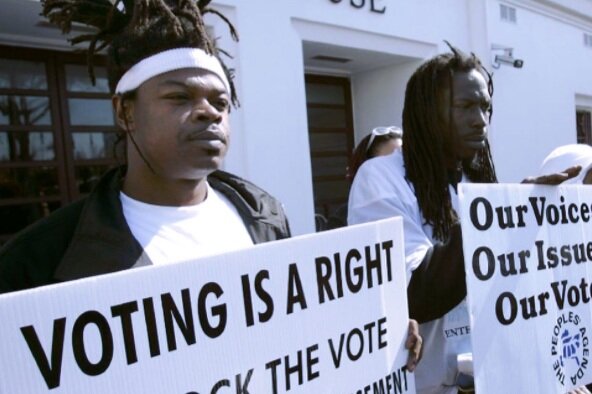
Voting in Radical Times – Fugitive Politics, Democratic Dreams, and the 2018 Midterm Elections
A conversation with Fred Moten, Kennan Ferguson, and Elisabeth Anker moderated by Cristina Beltrán, Social & Cultural Analysis and Politics, New York University.
Guests
Fred Moten, Performance Studies, New York University
Kennan Ferguson, Political Science, University of Wisconsin, Milwaukee
Elisabeth Anker, American Studies, George Washington University

Migrant Justice in the Age of Illegality with Professor Alicia Schmidt Camacho
A lecture about Migrant Justice in the Age of Illegality by Alicia Schmidt Camacho, Professor of American Studies and Ethnicity, Race, and Migration at Yale University.
Dr. Alicia Schmidt Camacho is a Professor of American Studies and Ethnicity, Race, and Migration at Yale, and the Associate Head of Ezra Stiles College. Her scholarship concerns the femicide in Ciudad Juárez, transnational migration, border governance, and social movements in the Americas. She is the author of Migrant Imaginaries: Latino Cultural Politics in the Mexico–U.S. Borderlands (NYU Press, 2008). It discusses “transnational movements of Mexican migrants in pursuit of labor and civil rights in the United States from the 1920s onward.” She is currently at work on a second book project entitled, The Carceral Border: Social Violence and Governmentality on the Frontiers of Our America. She chairs the board of Junta for Progressive Action, a community agency serving the Latina/o community of Fair Haven, and is a contributor to local and transnational projects for immigrant and human rights.
The event was organized by The Working Group in Latinx History with co-sponsorships of The History Department, NYU Steinhardt, and The Center for Latin American and Caribbean Studies.
The hashtag for the event was #NYULatinxHistory
Event Recap
Dr. Alicia Schmidt Camacho visited us to speak about the caravans carrying asylum seekers to the U.S-Mexico border. She discussed the power displayed in the caravan’s ability to test limits of multiple nation-states, and that their collectivity and will teach us much about mobilization and organizing.
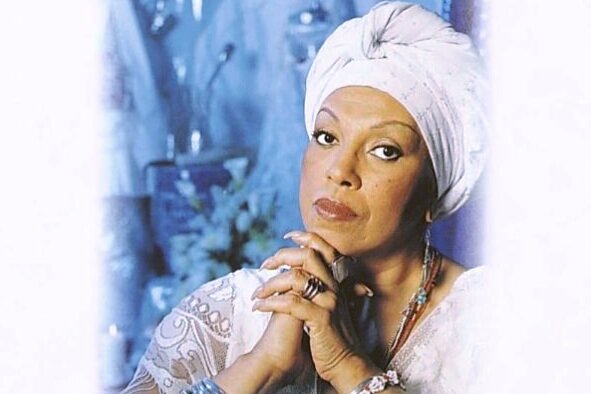
Voices From The Battlefront 25 Years Later
A conversation with independent curator Yasmin Ramirez, Curator and Arts Promoter Rocío Aranda-Alvarado and artist Yasmín Hernández reflecting on the work of Dr. Marta Moreno Vega; the impact and legacy of her publications, exploring cultural equity, decolonizing institutions, art history, and more.
Yasmin Ramirez, Ph.D., is an independent curator who specializes in Nuyorican and Latinx art. She is an adjunct curator for the Bronx Museum of the Arts and serves on the National Steering Committee for the biennial conference, Latino Art Now.
Yasmín Hernández is a Brooklyn-born and raised artist who researches, reflects, writes and paints on repatriation, healing, light, and love as de-colonial strategies.
Rocío Aranda-Alvarado is a Program officer for Creativity and Free Expression at the Ford Foundation, and a long time curator El Museo del Barrio and the Jersey City Museum.
Event Recap
On November 27th, 2018 we honored Dr. Marta Moreno Vega, an advocate for Afro-Latinx, Puerto Rican, & Indigenous rights/visibility. We invited three arts professionals including independent curator Dr. Yasmin Ramirez, artist and writer Yasmin Hernandez, and curator Rocio Aranda-Alvarado to highlight and observe Dr. Vega’s legacy fighting for cultural equity.
This event comes as we celebrate the 25th anniversary of Dr. Vega’s edited volume ‘Voices from the Battlefront: Achieving Cultural Equity.’ The Latinx Project’s Director Arlene Dávila opened the event discussing how matters of cultural equity are issues the project aims to highlight regularly, issues that she says are almost synonymous with Marta Moreno Vega.
We heard from Dr. Yasmin Ramirez who said Dr. Vega’s book, Voices from the Battlefront: Achieving Cultural Equity, was her first introduction to Afro-Boricua art history and when she learned that Afro-Boricuas were written out of history.
Diasporic artist, Yasmin Hernandez whose practice centers de-colonial aesthetics then discussed her first memories hearing Dr. Vega speak and being inspired by her ability to build cross-cultural coalitions. She also asked questions about decolonization and how we undo colonized narratives of U.S. supremacy. She credits Dr. Vega’s references to back to Africa's movements as inspiration for what she calls her “rematriation” to Puerto Rico from Brooklyn.
Rocio Aranda-Alvarado discussed how Dr. Vega was a living example of how cultural workers and art are should support the growth of community. She also added that Dr. Vega was key in creating the philosophical underpinnings of El Museo del Barrio which include maintaining a responsibility to educate and connect meaning between the community and the objects in the museum.
Aranda-Alvarado also referenced several innovative exhibits put on by Dr. Vega that she has looked to throughout her career as guiding examples like shows on Katherine Dunham and Elizabeth Catlett, The Art Heritage of Puerto Rico at the Metropolitan Museum of Art (exhibition catalog can be downloaded here and Transforming the Crown: African, Asian and Caribbean Artists in Britain, 1966-1996.
Below are books Dr. Vega shared that informed her education about Black, Latinx, and Indigenous intellectual frameworks and philosophy.
Flash of the Spirit by Robert Farris Thompson
Out There: Marginalization and Contemporary Culture by Russell Ferguson
Black Popular Culture by Michelle Wallace
Divided Borders: Essays on Puerto Rican Identity by Juan Flores
The Signifying Monkey by Henry Louis Gates Jr.
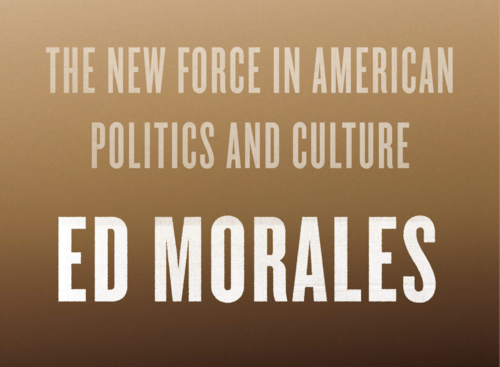
Latinx – The New Force in American Politics and Culture
Author, Ed Morales and Professor Ana Maria Dopico from New York University’s Department of Spanish and Portuguese discussed Morales’ new book, Latinx: The New Force in American Politics and Culture.
Ed Morales is a journalist who writes about New York City electoral politics, police brutality, street gangs, grassroots activists, and the Latino arts and music scene. He currently lectures at Columbia University’s Center for the Study of Ethnicity and Race, was previously a staff writer for the Village Voice and has published widely. His previous books include Living in Spanglish and The Latin Beat: From Rumba to Rock. He also co-directed the 2009 documentary called “Whose Barrio?” about the gentrification of East Harlem.
His book is about the Latinx political identity and how the confluence of different cultures, races, and languages of Latinx dispute the U.S.’s narrative of a black/white binary. Latinx comprise 58 million people in the U.S. and are the fastest-growing group in the nation, yet are often ignored in discussions of race and ethnicity.
Speaking more specifically about the term ‘Latinx’ to NBC journalist Raul Reyes, Morales says, “Latinx is a fascinating identity because it’s futurist and points to how a society can evolve with lots of different groups coming together for a common cause.”
His op-ed in the Guardian goes further into his reasons for embracing the term. “Like superheroes of color and the possibilities inherent in girls and everyone else who code, Latinx represents an openness that is increasingly under threat in a political climate that is most intent on drawing borders, keeping outsiders out, and using violence to keep it that way.”
Ana Maria Dopico is the first Latina Director of King Juan Carlos I of Spain Center and is an Associate Professor of Comparative Literature and Spanish and Portuguese at New York University.
Event Recap
This event with Ed Morales discussed his new book Latinx: The New Force in American Politics and Culture with Ana Maria Dopico, a cultural critic and the first Latina director of The King Juan Carlos I of Spain Center at New York University. Dopico opened the night by outlining how necessary and wide-ranging this book is. She said it gives us a “deep history of the genealogy of what we’ve inherited, and the intellectual history by which we are named” while also discussing how Latinx are marketed to as economic groups, the histories of cities, the class and racial identities of up and coming politicians, and even film analysis. About three years ago, Morales began to hear the term Latinx in his classroom at Columbia’s Center for Race and Ethnicity and it sparked his idea for this book. There are so many avenues to explore when talking about the history of race for Latinx but Morales has a way of breaking down key moments of our conglomerate history without simplifying it. He goes as far back as referencing the moral discussions about indigenous humanity between Juan Ginés de Sepúlveda and Bartolome de las Casas in the 16th century, white supremacy as seen through Mexican Casta paintings, and what slavery was like in different parts of Latin America. All of this is in an effort to round out the current conversation about where Latinx is today in relation to this strict racial binary of black and white.
And after some talk of complicated racial histories, Dopico brought the discussion full circle to the frightful political time, to discuss the voting patterns of Latinos, especially after the midterm voting results: “I’m tired of hearing ‘oh it’s complicated’ when talking about Latinos and politics. It’s not complicated. It’s about race and class.” Later she added that “there’s a huge terror in this particular reactive moment that something is going to be stripped from you that your aspirational whiteness is going to be taken away.”
But “whiteness is looking really bad now. It’s not the liberal whiteness of the past. It’s looking very ugly so it may be easier for Latino people to move away from whiteness,” Morales said. “[Race] is all a social construct but at the same time that fluidity can be exploited and turned against you politically.”
These are all huge topics to cover in an hour and a half but the discussion was fruitful and we had many people in the audience share their ideas about racial identity and ethnic identifiers. If you haven’t read the book, it’s available on Verso books here. And as Dopico said, “It’s a big and important book, and mandatory for anyone trying to take up this term.”
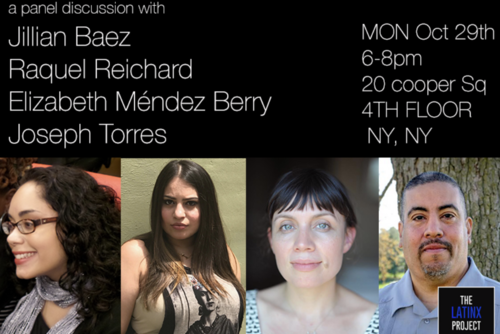
The State of Latinx Media
A panel discussion about the latest insights on Latinx media featuring Jillian Báez, Raquel Reichard, Elizabeth Méndez Berry, and Joseph Torres moderated by Professor Urayoan Noel, professor of Spanish & Portuguese, at New York University. The conversation will touch on research, the state of cultural criticism, the newest on digital platforms, and the larger policies affecting net neutrality and media access, in addition to a focus on key strategies for engagement and activism for making change. This event was organized by The Latinx Project and co-sponsored by The Program in Culture and Media, and The MCC (Media, Culture and Communications Department).
There is no question that Latinx audiences are hungry for representation and relevant subject matter in media, but are the existing Latinx outlets doing their audiences justice? From Latino USA to Remezcla to Mitu to Univision to Bese, Latinx media platforms and content exist but are there enough? What are the key strategies for engagement, especially in regards to activism, that comes with the territory of creating Latinx media? As content creators- writers, activists, and critics- we want to discuss these important and timely issues.
Get ready for a dynamic discussion about the State of Latinx Media on Monday by learning about our panelists that include award-winning journalists, media activists, cultural critics, and professors! Here is a little about who they are, what they will discuss, and a few links to their work:
Professor Jillian Báez will discuss her new research on Latina audiences & matters of representation on and off camera. She recently published the book In Search of Belonging: Latinas, Media, and Citizenship.
Raquel Reichard is a widely published Latinx media content producer who has worked across platforms such as Latina, Mitú, Remezcla, Teen Vogue, and more. Here is her recent article highlighting Latina progressives running for office.
Elizabeth Mendez Berry will discuss critics of color and how they affect the evaluation of Latinx creatives. Read her piece Why Cultural Critics of Color Matter on Hyperallergic.
Net-neutrality and media activist Joseph Torres whose last book co-authored with Juan Gonzalez News for all the People gave a historical run down about race and the American media will discuss the latest in regards to media policy and what audiences can do through activism. Check out his article about the Kerner Commission- a report that “documented the media’s role in contributing to our nation’s racial divisions.”
The event was moderated by Urayoán Noel, a professor of English and Spanish, writer, critic, performer, translator, and intermedia artist.
Panelists
Jillian Báez is an Associate Professor at CSI at CUNY and specializes in Latina/o media, audience studies, transnational feminisms, and media literacy. Dr. Báez is the General Editor of Women’s Studies Quarterly. She is also the author of In Search of Belonging: Latinas, Media, and Citizenship.
Elizabeth Méndez Berry is a cultural critic and director of Voice, Creativity, and Culture, The Nathan Cummings Foundation.
Joseph Torres is an author, media activist and Senior Director of Strategy and Engagement at FREE Press.
Raquel Reichard is an award-winning, Orlando-based journalist and editor covering Latinx social justice, political and cultural issues.
Event Recap
At this panel, four experts from various media-related fields gave their take on the state of Latinx Media.
Recently tenured professor of media and culture at CUNY, Jillian Báez, opened our discussion by reading an excerpt from her book In Search of Belonging Latinas, Media and Citizenship where she discusses the iconic movie West Side Story as being instructional. Her family used it as a way to talk about the discrimination they faced as Puerto Ricans in the U.S. among many other things. She goes on to discuss how relevant representation is and how that even in the representation we do have, there are problems. In order to come to terms with all the issues, more research, analysis, and media literacy campaigns need to be done.
Raquel Reichard then gave her take on the current state of Latinx media as an advocacy journalist and Latina feminist. She stated that she doesn’t believe in objectivity and went on to say it’s not needed to create good journalism. “You can be upfront with your readers about your position and still write a fair and well-researched piece of journalism.” Her perspective as someone currently working in the field, trying to stay afloat while not compromising her integrity, was very interesting considering Latinx media platforms are dropping like flies.
Elizabeth Mendez Berry shared her experience as a music writer in the 2000s when music criticism was valued in the industry as well as beyond white readership. She has now pivoted to working in philanthropy, most recently for the Nathan Cummings Foundation, and is an ardent cultural critic advocate. “Critical thinking is important for artistic practice, and it’s also really important for democracy,” she said.
And lastly, net neutrality and free press advocate Joe Torres talked about his work strategizing to change the infrastructure and laws around media policy. Organizing to maintain net neutrality and mediate corporate interests in the media is essential even though he says the future looks bleak. “Transformation doesn’t always mean we get to see it,” he said, but that doesn’t mean our work is not valuable.
There was also some homework advice given to the audience about how to support Latinx media
Share articles you think are good.
Write messages to editors and tell them when you like or hate writers.
We need more media literacy for ethnic media, not just mainstream.
Donate to organizations doing work to keep the media fair.
There were so many other great things said, and we’re hoping to build on this conversation and look to solutions to build a better, more sustainable Latinx press.
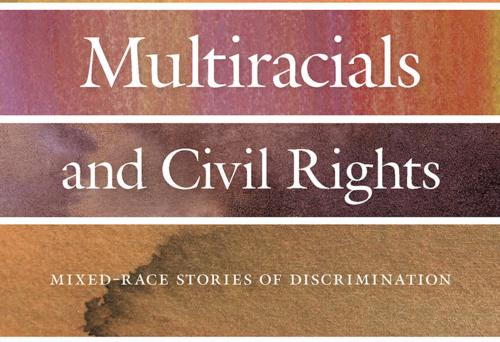
New Perspectives on Latinxs, Race and Contemporary Racism
A discussion with three cutting edge Latina scholars working in literature, history and legal theory discussing Tanya Katerí Hernández’s newly released book, Multiracials and Civil Rights: Mixed-Race Stories of Discrimination.
Vanessa Valdes is an Associate Professor of Spanish and Portuguese at the City College of New York and author of Diasporic Blackness: The Life and Times of Arturo Alfonso Schomburg.
Nancy Mirabal, is the Director of the U.S. Latina/o Studies Program at the University of Maryland and the author of Suspect Freedoms: The Racial and Sexual Politics of Cubanidad in New York, 1823-1957.
Saudi Garcia, Ph.D. is a graduate student in Anthropology, whose research focuses on socialization, cultural heritage of second-generation immigrant youth and diaspora social theory. She was the moderator of the discussion.



